Last month, I wrote about fear. Fear of embarrassing oneself is often a hitch factor in creativity. "What if this idea is no good?" "What if people laugh at this idea?" are pretty common ones, and that sort of fear can be paralyzing.
But it's also exceedingly common. It takes a long time to overcome that fear of failure, that fear of not being good enough. Many people, and I'll add that many successful people retain that crippling fear that what they make is not fit for public consumption, and that makes them hesitate.
Which is not to say that creation is easy, or that everything that we make is fit for public consumption. Nickolaus Pacione has taught me that, if nothing else. But I'll never get anywhere if I don't start. I'll never develop good ideas if I don't work through the bad ones, and have enough of each to recognize a bad one when it presents itself. More importantly, if I hadn't cycled through a bunch of ideas, I'll never get comfortable with the concept that ideas are easy to come by. Ideas are cheap. Good ideas are plentiful. Being willing to discard mediocre ideas means that I spend less time wrangling them. Because experience has shown me that if I wait five minutes, a better idea will come up.
Is also seems that, after five years, I'm going to hit 20,000 views of this blog. I'm aware that the majority are Google search hits, and that I have yet to break a thousand hits in a single month. But thank you to everyone who has read this strange personal/writing blog.
The personal blog of John Goodrich, including, but not limited to kaiju film and comics involving swamp creatures.
Thursday, December 6, 2012
Sunday, December 2, 2012
Song of the Vikings
For a good time? Go to an author's reading. The Northshire Bookstore recently had an author signing for Nancy Marie Brown who has just released Song of the Vikings a book about the very interesting historian/skald of Iceland, Snorri Sturluson.
I learned a lot, just in an hour. I knew, for example, that my 'escapist' reading eas looked down on when I was in college, that Tolkien had only a grudging respect in academia in the early 90's because he had written part of the Oxford English Dictionary, and because his books had sold so well. How much more frustrating it must have been earlier, when he didn't have the cache of being so popular. He was only an Oxford Dean, back then.
I love my Tolkien. I love my Icelandic saga. While they are not the same, they go hand-in-hand with a certain number of sensibilities. And those have been passed onto a few generations of writers. And I consier that a good thing. But it's always interesting to understand the origins of something I enjoy, as well as it's influences. It's why I'm totally hooked on movie commentaries and extras. What was the process that lead to the creation of something like the Lord of the Rings or Pan's Labyrinth?
Snorri Sturluson was a poet and powerful landowner in 13th Century Iceland. He wrote many of the stories we clasically associate with Norse mythology, and laid the foundations for the early modern view of heroism. But Snorri's story also has unexpected moments of connection to the work of Tolkien. For example, the day of his death. September the 22nd. Which is, for the non-Tolkein fanatics out there, Bilbo and Frodo's shared birthday. Hm.
Nancy Marie Brown is a good speaker, interesting and informative. She really knew how to hook me as a listener in. She was pleasant to speak with and clealy knew her stuff. Who wouldn't want a book or two signed by her?
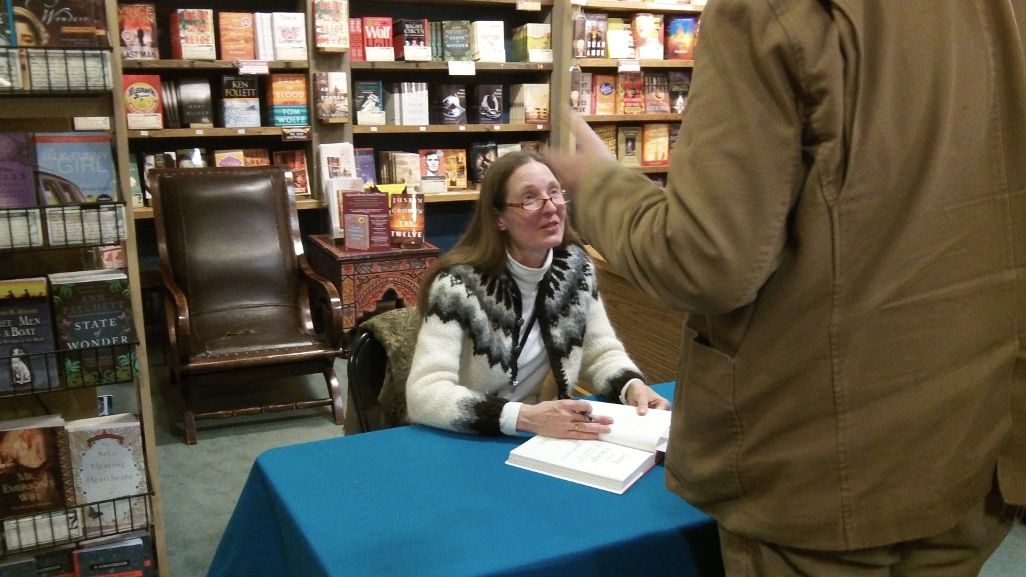
According to her blog, what prompted her to start writing this book was reading Neil Gaiman's American Gods. Neil Gaiman, if you aren't a long-time reader, is, in my opinion, the second-most dropped name in English. I can't wait to dive into Song of the Vikings.
I learned a lot, just in an hour. I knew, for example, that my 'escapist' reading eas looked down on when I was in college, that Tolkien had only a grudging respect in academia in the early 90's because he had written part of the Oxford English Dictionary, and because his books had sold so well. How much more frustrating it must have been earlier, when he didn't have the cache of being so popular. He was only an Oxford Dean, back then.
I love my Tolkien. I love my Icelandic saga. While they are not the same, they go hand-in-hand with a certain number of sensibilities. And those have been passed onto a few generations of writers. And I consier that a good thing. But it's always interesting to understand the origins of something I enjoy, as well as it's influences. It's why I'm totally hooked on movie commentaries and extras. What was the process that lead to the creation of something like the Lord of the Rings or Pan's Labyrinth?
Snorri Sturluson was a poet and powerful landowner in 13th Century Iceland. He wrote many of the stories we clasically associate with Norse mythology, and laid the foundations for the early modern view of heroism. But Snorri's story also has unexpected moments of connection to the work of Tolkien. For example, the day of his death. September the 22nd. Which is, for the non-Tolkein fanatics out there, Bilbo and Frodo's shared birthday. Hm.
Nancy Marie Brown is a good speaker, interesting and informative. She really knew how to hook me as a listener in. She was pleasant to speak with and clealy knew her stuff. Who wouldn't want a book or two signed by her?

According to her blog, what prompted her to start writing this book was reading Neil Gaiman's American Gods. Neil Gaiman, if you aren't a long-time reader, is, in my opinion, the second-most dropped name in English. I can't wait to dive into Song of the Vikings.
Wednesday, November 14, 2012
Not as Other Men
A strange experience today. The Boss was talking about the need to come up with an idea for a store Christmas tree. He didn't want one that was loaded with merchandise; he's done that on previous occasions. And there's been a problem with the stuff under the tree getting wet. So he asked me if I could help, since I'm 'artistic.'
Which I don't really consider myself. I can paint miniatures in a way that's not terribly embarassing, but I'm massively the suck when it comes to putting anything in two dimensions. Nevertheless, within fifteen minutes, we had a concept that he was pleased with.
What I don't understand is how I'm different from him. He could have easily come up with the Donkey-Kong Christmas Tree. Princess Peach at the top, Kong 'throwing' barrel decorations down the tree, perhaps with a garland to indicate the platforms, and Mario at the bottom. It's a simple idea, which I got from looking at the Donkey-Kong themed energy drinks in the cooler. And my quesion is, why didn't the Boss have this idea? Is it because I spend time coming up with stuff? Because I pay more attention to my surroundings (ie am more easily distracted)? Is this sort of thing innate? Something I've developed where the Boss never did? Am I less afraid of failure so I start and am confident that if one idea fails another will be useful because that's the way I work?
But it was all so easy. Just chunk up one idea and then another (my first was to have a Pac-Man tree. Inspired by the Pac-Man energy drink sitting right next to the Donkey-Kong drink. The next pitch was likely to be a Red Bull treee).
It's just strange to me. What do people do if they can't come up with ideas?
Which I don't really consider myself. I can paint miniatures in a way that's not terribly embarassing, but I'm massively the suck when it comes to putting anything in two dimensions. Nevertheless, within fifteen minutes, we had a concept that he was pleased with.
What I don't understand is how I'm different from him. He could have easily come up with the Donkey-Kong Christmas Tree. Princess Peach at the top, Kong 'throwing' barrel decorations down the tree, perhaps with a garland to indicate the platforms, and Mario at the bottom. It's a simple idea, which I got from looking at the Donkey-Kong themed energy drinks in the cooler. And my quesion is, why didn't the Boss have this idea? Is it because I spend time coming up with stuff? Because I pay more attention to my surroundings (ie am more easily distracted)? Is this sort of thing innate? Something I've developed where the Boss never did? Am I less afraid of failure so I start and am confident that if one idea fails another will be useful because that's the way I work?
But it was all so easy. Just chunk up one idea and then another (my first was to have a Pac-Man tree. Inspired by the Pac-Man energy drink sitting right next to the Donkey-Kong drink. The next pitch was likely to be a Red Bull treee).
It's just strange to me. What do people do if they can't come up with ideas?
Wednesday, October 31, 2012
"You Only Fail If You Stop Writing" --Ray Bradbury
I came close to failing. I haven't updated my blog in close to two months, it took me those two months to write a 3,000 word story. I had stopped working on my novel, and was considering getting out of the writing game.
Writing is work. It is not fun. It is the terrible opportunity to sit down in front of a mirror and look at yourself. For hours. On the other hand, I feel better after I have written. I find myself with greater clarity, a greater capacity to concentrate, and overall have a sense of accomplishment I fail to get from my work life.
I love reading. Writing seems, in some ways, to be my self-medication. The problem is when I don't have the motivation to do it, I fall apart without that activity which centers me.
I used to try to count the number of attributes someone needed to be a writer. I've lost count. Someone needs an ability with words, good ideas, that special dedication that lets them pump out words on a daily basis, a thick skin that doesn't take rejection to heart, an ego that believes it needs to be heard, a compliant enough personality that allows others to mess with their manuscript, a cheerfulness that is undampened by hours spent alone with only their own words for company, the tireless energy it takes to self-promote, even when the publisher is doing so.
Some of these things come naturally to some people. Others must work on several aspects. I'm still working on several. But I'm back. I'm working on my feelings of isloation by having a Pathfinder group meeting at my house. I'd say it might cut into my writing, but I'm barely getting any done at the moment. And it's nice to have people in the house. They're a good group, and they make a pleasant change from the social interaction I get at work.
I've sent some short stories out, "A Poor Sinner's Hands" to Atomic Age Cthulhu, "No Small Dreams" to Aetherial Publishing, "Nicaragua 1986" to Anthology II (which I didn't get in to) and "Between Two Living Gods" to Epitaphs 2. But I've also got a number of stories basically sitting around and I need to get them back into circulation. I also need to finish my novel, because I'm having ideas for the next one, and that's the most fun I've had for a couple of months.
So Happy Halloween. May scary things happen to you, and may you enjoy them. I'm starting to, again.
Writing is work. It is not fun. It is the terrible opportunity to sit down in front of a mirror and look at yourself. For hours. On the other hand, I feel better after I have written. I find myself with greater clarity, a greater capacity to concentrate, and overall have a sense of accomplishment I fail to get from my work life.
I love reading. Writing seems, in some ways, to be my self-medication. The problem is when I don't have the motivation to do it, I fall apart without that activity which centers me.
I used to try to count the number of attributes someone needed to be a writer. I've lost count. Someone needs an ability with words, good ideas, that special dedication that lets them pump out words on a daily basis, a thick skin that doesn't take rejection to heart, an ego that believes it needs to be heard, a compliant enough personality that allows others to mess with their manuscript, a cheerfulness that is undampened by hours spent alone with only their own words for company, the tireless energy it takes to self-promote, even when the publisher is doing so.
Some of these things come naturally to some people. Others must work on several aspects. I'm still working on several. But I'm back. I'm working on my feelings of isloation by having a Pathfinder group meeting at my house. I'd say it might cut into my writing, but I'm barely getting any done at the moment. And it's nice to have people in the house. They're a good group, and they make a pleasant change from the social interaction I get at work.
I've sent some short stories out, "A Poor Sinner's Hands" to Atomic Age Cthulhu, "No Small Dreams" to Aetherial Publishing, "Nicaragua 1986" to Anthology II (which I didn't get in to) and "Between Two Living Gods" to Epitaphs 2. But I've also got a number of stories basically sitting around and I need to get them back into circulation. I also need to finish my novel, because I'm having ideas for the next one, and that's the most fun I've had for a couple of months.
So Happy Halloween. May scary things happen to you, and may you enjoy them. I'm starting to, again.
Tuesday, September 4, 2012
Challenge Failed...
I didn't manage to get the story written by Sunday. I've got the nugget of a first draft, but it needs to be about a thousand words longer to get into the anthology I'm aiming for. But I've got the storylinwe down, I just need to fill it out, and possibly add another scene.
Monday, August 27, 2012
"Oh Bother," said Pooh As He...
Yes, I should be writing my story.
Have you ever created something completely off the cuff that went beyond all your expectations?
Some time ago, RPG.net's Tangency section was having a lot of difficulty being civil. So I created a topic: Finish the sentence: "Oh bother," said Pooh, as he..."
. I had hoped it would give the forum-posters something to not argue about. And it did. the thread has gone on and on and on.
Warning, it's not safe for work. It's all words, but good heavens, there's a lot of dear old Pooh Bear having sex, murdering people, getting involved in necrophilia (generally with other inhabitants of the Hundred Acre Wood). The sheer breadth of topics it covers contnues to astonish me. From Back to the Future to The Matrix, Quantum Leap, Quentin Tarrantino, drug abuse, mass murder, to Lost. Because it's a nerd forum, there's also a pile of Lovecraftian references, Paranoia nods, zomibes, WWII references, recutrsive time loops, political digs, free-verse poetry, Star Wars, Shakespeare, fanfic, wingfic, iPhones, Doctor Who, and House of Leaves.
I starred it in 2004. Let me give you some perspective. Doctor Who hadn't been revived yet. The Halo franchise had just released video teasers for Halo 2. I wish I could take any sort of credit for the length of the thread's endurance, but it's really due to the people who grasped the concept and ran with it. Still, it's kind of interesting to look at.
Have you ever created something completely off the cuff that went beyond all your expectations?
Some time ago, RPG.net's Tangency section was having a lot of difficulty being civil. So I created a topic: Finish the sentence: "Oh bother," said Pooh, as he..."
. I had hoped it would give the forum-posters something to not argue about. And it did. the thread has gone on and on and on.
Warning, it's not safe for work. It's all words, but good heavens, there's a lot of dear old Pooh Bear having sex, murdering people, getting involved in necrophilia (generally with other inhabitants of the Hundred Acre Wood). The sheer breadth of topics it covers contnues to astonish me. From Back to the Future to The Matrix, Quantum Leap, Quentin Tarrantino, drug abuse, mass murder, to Lost. Because it's a nerd forum, there's also a pile of Lovecraftian references, Paranoia nods, zomibes, WWII references, recutrsive time loops, political digs, free-verse poetry, Star Wars, Shakespeare, fanfic, wingfic, iPhones, Doctor Who, and House of Leaves.
I starred it in 2004. Let me give you some perspective. Doctor Who hadn't been revived yet. The Halo franchise had just released video teasers for Halo 2. I wish I could take any sort of credit for the length of the thread's endurance, but it's really due to the people who grasped the concept and ran with it. Still, it's kind of interesting to look at.
Sunday, August 26, 2012
I Challenge Myself to Write...
I challenge myself to write my Atomic Age Cthulhu story, provisionally "To the Hogs" in a week. To be done by Sunday, September 2nd.
I say this here, so that people will know, and I will pressure myself to do it. Anyone who reads this and is curious has my permission to ask me how the story is going.
I say this here, so that people will know, and I will pressure myself to do it. Anyone who reads this and is curious has my permission to ask me how the story is going.
Friday, August 17, 2012
Sale!
I'm proud to announce that my mad airships, steam biplanes, and a world without royalty story "Pain Wears No Mask" as been accepted into Glynn Barass and Brian Sammons' Steampunk Cthulhu. I'm in some pretty awesome company here:
Those Above – Jeffrey Thomas
Blackwold Horror – Adam Bolivar
No Hand to Turn the Key – Carrie Cuinn
The Reverend Mr. Goodworks and the Yeggs of Yig – Ed Erdelac
Carnacki – The Island of D. Munroe – William Meikle
Pain Wears No Mask – John Goodrich
Before the Least of These Stars – Lee Clark Zumpe
The Promised Messiah – DJ Tyrer
Unfathomable – Christine Morgan
The Flower – Chris Geeson
Tentacular Spectacular - Thana Niveau
Fall of an Empire – Glynn Owen Barrass & Brian M. Sammons
The Baying of the Hounds - Leigh Kimmel
Mr Brass and the City of Devils – Josh Reynolds
The Source – DL Snell
Happy Birthday, Dear Cthulu - Robert Neilson
The Strange Company – Peter Rawlik
Steel and Bones – Lois Gresh
No Hand to Turn the Key – Carrie Cuinn
The Reverend Mr. Goodworks and the Yeggs of Yig – Ed Erdelac
Carnacki – The Island of D. Munroe – William Meikle
Pain Wears No Mask – John Goodrich
Before the Least of These Stars – Lee Clark Zumpe
The Promised Messiah – DJ Tyrer
Unfathomable – Christine Morgan
The Flower – Chris Geeson
Tentacular Spectacular - Thana Niveau
Fall of an Empire – Glynn Owen Barrass & Brian M. Sammons
The Baying of the Hounds - Leigh Kimmel
Mr Brass and the City of Devils – Josh Reynolds
The Source – DL Snell
Happy Birthday, Dear Cthulu - Robert Neilson
The Strange Company – Peter Rawlik
Steel and Bones – Lois Gresh
Cover coming soon.
Wednesday, August 1, 2012
Monday, July 16, 2012
I'm A Horror Writer, What Do I Fear?
It's been a turbulent couple of weeks. First of all, my brother and sister-in-law came up, and we went out to play with birds again:
Which was really fun.
As for the writing, well there's a story. One of the things you're told never to do is put a story/novel/whatever down, because it's difficult to pick back up again. And there's a certain amount of truth to that. My current novel has been put down and picked back up a couple of times. Last week, I got wind of a very attractive anthology, and I had a good idea. Unfortunately, the idea does not work within the tmeframe of the anthology.
Which leaves me with a dilemna. Do I want to try another story (I've already got an idea) or do I want to go back to the novel?
The problem with going back to the novel is that it scares me. I'm almost done, at which point I'll have to revise my previous novel, and start on my next one. And begin looking at publication options (you know, that stuff from my last post). And yeah, I've got that feeling in my stomach, that I'm once again stepping into unknown territory, and I don't want to do the wrong thing.
The funny thing is that I didn't feel this nervous, or I don't remember feeling this nervous, last time I finished a novel. But it might have been that I had less expereince with trying to get a novel published, or that publishing wasn't in quite so much turmoil.
And I don't blog well when I'm all confused about stuff. Sorry. But hey, NECON at the end of the week. I'm hoping for some good advice.
Which was really fun.
As for the writing, well there's a story. One of the things you're told never to do is put a story/novel/whatever down, because it's difficult to pick back up again. And there's a certain amount of truth to that. My current novel has been put down and picked back up a couple of times. Last week, I got wind of a very attractive anthology, and I had a good idea. Unfortunately, the idea does not work within the tmeframe of the anthology.
Which leaves me with a dilemna. Do I want to try another story (I've already got an idea) or do I want to go back to the novel?
The problem with going back to the novel is that it scares me. I'm almost done, at which point I'll have to revise my previous novel, and start on my next one. And begin looking at publication options (you know, that stuff from my last post). And yeah, I've got that feeling in my stomach, that I'm once again stepping into unknown territory, and I don't want to do the wrong thing.
The funny thing is that I didn't feel this nervous, or I don't remember feeling this nervous, last time I finished a novel. But it might have been that I had less expereince with trying to get a novel published, or that publishing wasn't in quite so much turmoil.
And I don't blog well when I'm all confused about stuff. Sorry. But hey, NECON at the end of the week. I'm hoping for some good advice.
Friday, June 22, 2012
Tectonic Attitude Shift Ahoy!
So, I've been looking at publishing from a decidedly last decate point of view. Partially because the first research I did was, well, in the 90's. I've found my gurus, and the people I trust, and lacking much in the way of other expertise, I've followed them: get an agent, they'll get you a publisher, and off you go.
That's changing, though.
I'm finishing up my second solo book. And it's a good book. When I began writing, self-publishing was the way to go for those who had given up on the publishing game. Who couldn't navigate the game well enough to That's changing. Read Glen Krisch's guest blog on Brian Keene dot com. I'll wait.
Now, Glen is exceptional in that he has been an editor, so he's clearly ahead of most people in the writing game. He's got sterling prose, just read his blog entry. It's an interesting read, moves along quickly, and unlike this blog, has no typos.
The thought of freedom is seductive. While I doubt sales of my books are going to keep me afloat without another job, it mught be a good start. And I could continue the series I have wanted to much to write. But there's stuff to consieder: having an editor look at the work, getting a cover, making sure it is as polished as it can possibly be, and then promoting it.
How the hell do you promote an e-book? Well, that's something I'm going to have to research.
I'm really scared. If I don't put out the best book I can, I might not find my readership, and I desperately want readers. I think I'm saying a thing or two that people want to hear, even need to hear. And if I self-publish, it's all going to be on my head to get it the hell done.
On the other hand, I might just ring the cherries.
I'm going to look at traditional, small publishers who have decent track record before I really investigate self-pub route. There are still a lot of rip-offs out there. But I think my current novel is strong enough that it will catch someone's attention. But now I have a backup plan. And strangely, that makes me feel more secure.
That's changing, though.
I'm finishing up my second solo book. And it's a good book. When I began writing, self-publishing was the way to go for those who had given up on the publishing game. Who couldn't navigate the game well enough to That's changing. Read Glen Krisch's guest blog on Brian Keene dot com. I'll wait.
Now, Glen is exceptional in that he has been an editor, so he's clearly ahead of most people in the writing game. He's got sterling prose, just read his blog entry. It's an interesting read, moves along quickly, and unlike this blog, has no typos.
The thought of freedom is seductive. While I doubt sales of my books are going to keep me afloat without another job, it mught be a good start. And I could continue the series I have wanted to much to write. But there's stuff to consieder: having an editor look at the work, getting a cover, making sure it is as polished as it can possibly be, and then promoting it.
How the hell do you promote an e-book? Well, that's something I'm going to have to research.
I'm really scared. If I don't put out the best book I can, I might not find my readership, and I desperately want readers. I think I'm saying a thing or two that people want to hear, even need to hear. And if I self-publish, it's all going to be on my head to get it the hell done.
On the other hand, I might just ring the cherries.
I'm going to look at traditional, small publishers who have decent track record before I really investigate self-pub route. There are still a lot of rip-offs out there. But I think my current novel is strong enough that it will catch someone's attention. But now I have a backup plan. And strangely, that makes me feel more secure.
Tuesday, June 12, 2012
My Complex Relationship With Reviews...
Conventional wisdom is that when a writer gets a positive review, it's because they have earned it. When we get a negative review, it's because the reviewer is some sort of whackjob with an axe to grind, or just didn't 'get' the story. So feel the love from positive feedback, and let the negative ones just slide off your back.
The truth is that my relationship with reviews is a lot more complex than that. We always read the reviews. The writer who does not either has too many reviews to read, or they have antifreeze for blood. Either way, they are people to be feared and respected.
Everyone gets bad reviews. My best negative review is from Amazon, concerning "Captains of Industry" from Cthulhu's Dark Cults which says "'Captains of Industry' left me feeling like a few pages were missing. Lots of union rhetoric (all good), and a few 'who are these guys and what are they doing' issues, but nothing chilling. I was confused as to why this had been written, as it seemed to have no overall point or connection to the cthulhu concept. Yes, union busters and early industrialists were bad news at times, but this left me confused." And a part of me says "He didn't get it." Another part says "I should have made the connection to the Mythos more clear. And maybe there was a bit too much Socialist rhetoric for a horror story." But the story is out, and there's no way to revise it now.
On the other hand, Brian Keene praised the anthology and the story on his blog. I'll take Keene's praise over just about anyone else's. And certainly over most peoples' criticism. I've met the man, and he is a straight-talker. When he reviews his reading material, he is not thinking about whether I'm going to like (or, in this case, be over the moon) his review. He's thinking about what he read from the standpoint of someone who has read a HUGE amount. And writes a lot.
So I have two very different opinions of the same story. I can either tie myself up in knots by trying to reconcile the two, or I can think to myself "Hey, I pleased a reader whose opinion I respect, so I must be doing something right." And that's how I tend to look at positive reviews; I made a connection with someone who thought enough of the story to tell other people.
Part of the reason I bring this up is because I just received an enormously positive review of "Not an Ulcer" in the NEHW's Epitaphs Specifically, the reviewer likes my story more than anyone else's, and says so.
Now, I've read Epitaphs. It contains stories by Christopher Golden, Rick Hautula, and Peter Dunbar, all of whom are heavy hitters in the horror community. They're excellent, polished, professional writers, and their stories are, in every measurable way, better than mine.
I'm not just saying that because I respect them, or I've met them. I'm saying it because it's as true as a summer day is long. Their stories were better, and it would take someone like Stephen Hawking or Umberto Eco to sway my opinion. The chance I'm ever going to say to anyone "Hey, someone thought my story was better than Chris Golden's" is ZERO. Because his story was better than mine.
At the same time, the story clearly connected with the reader. It seems like I adequately conveyed my concept. And I'm glad they liked it.
The truth is that my relationship with reviews is a lot more complex than that. We always read the reviews. The writer who does not either has too many reviews to read, or they have antifreeze for blood. Either way, they are people to be feared and respected.
Everyone gets bad reviews. My best negative review is from Amazon, concerning "Captains of Industry" from Cthulhu's Dark Cults which says "'Captains of Industry' left me feeling like a few pages were missing. Lots of union rhetoric (all good), and a few 'who are these guys and what are they doing' issues, but nothing chilling. I was confused as to why this had been written, as it seemed to have no overall point or connection to the cthulhu concept. Yes, union busters and early industrialists were bad news at times, but this left me confused." And a part of me says "He didn't get it." Another part says "I should have made the connection to the Mythos more clear. And maybe there was a bit too much Socialist rhetoric for a horror story." But the story is out, and there's no way to revise it now.
On the other hand, Brian Keene praised the anthology and the story on his blog. I'll take Keene's praise over just about anyone else's. And certainly over most peoples' criticism. I've met the man, and he is a straight-talker. When he reviews his reading material, he is not thinking about whether I'm going to like (or, in this case, be over the moon) his review. He's thinking about what he read from the standpoint of someone who has read a HUGE amount. And writes a lot.
So I have two very different opinions of the same story. I can either tie myself up in knots by trying to reconcile the two, or I can think to myself "Hey, I pleased a reader whose opinion I respect, so I must be doing something right." And that's how I tend to look at positive reviews; I made a connection with someone who thought enough of the story to tell other people.
Part of the reason I bring this up is because I just received an enormously positive review of "Not an Ulcer" in the NEHW's Epitaphs Specifically, the reviewer likes my story more than anyone else's, and says so.
Now, I've read Epitaphs. It contains stories by Christopher Golden, Rick Hautula, and Peter Dunbar, all of whom are heavy hitters in the horror community. They're excellent, polished, professional writers, and their stories are, in every measurable way, better than mine.
I'm not just saying that because I respect them, or I've met them. I'm saying it because it's as true as a summer day is long. Their stories were better, and it would take someone like Stephen Hawking or Umberto Eco to sway my opinion. The chance I'm ever going to say to anyone "Hey, someone thought my story was better than Chris Golden's" is ZERO. Because his story was better than mine.
At the same time, the story clearly connected with the reader. It seems like I adequately conveyed my concept. And I'm glad they liked it.
Friday, June 8, 2012
Ra Was a Jerk!
Because I'm that nerd, I like to read translations of ancient manuscripts. If I was a real wonk, I'd be learning languages to get the real flavor of the text, but that's not going to happen. Except maybe with Old English.
Anyway, I've been reading the rather delightful Raymond Faulkner translation of the Ancient Egyptian Book of the Dead (or the Book of Coming Forth By Day, if you're more of an Egyptian nerd that I am). It's a pleasant translation, with color pictures of various papyrii makes it a pleasant read.
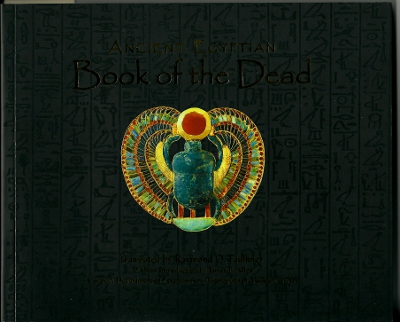
It's pretty common knowledge that the Egyptian Gods were pretty pleasant to the Egyptians. They had regular seasons, and the Nile's live-giving floods were mostly gentle. Unlike the Mesopotamians, whose gods were capricious at best, partially because the flooding of the Tigris and the Euphrates were highly variable, and could turn deadly without warning.
I'm beginning to question the Egyptian Gods' overall benevolence, as I read the Book of the Dead. It's is a collection of a hundred and eighty-nine spells intended to give the recipient a pass to the pleasant afterlife, as opposed to the bad one. There's a spell to ward off hostile crocodiles, one to transform the recipient into a heron should he so wish, and spells to demonstrate to the gods that the recipient is justified, and so should be able to go to the Field of Reeds.
However, there's a recurring theme that's more than a little disturbing. Spell 102, "For Going Aboard the Bark of Ra":
"O you who are great in your bark, bring me to your bark, so that I may take charge of your navigating in the duty which is alloted to one who is among the Unwearying Stars."
Sounds good so far, right? The Justified individual wants to get to be on Ra's boat, and help with the navigation. Which, hey, at least he's not asking to laze around and be a nuisance when everyone else is fighting off various demons of darkness. But there's a kicker in the very next line:
"What I doubly detest, I will not eat; my detestation is feces, and I will not eat it. I will not consume excrement, I will not approach it with my hands."
WOAH! Man, Ra is a jerk. Luxury all the way, taking control of the Bark that is the Sun, but if you don't say this spell, he's going to feed you shit for the rest of eternity? What kind of food service is there on that thing, anyway? It sounds suspiciously like one of those contracts written where anything not specified is supplied at absolute minimum. "Haw Haw!" laughs the God of the Sun. "You didn't say anything about provisions, so here's a big plate of poo!"
What a jerk.
Anyway, I've been reading the rather delightful Raymond Faulkner translation of the Ancient Egyptian Book of the Dead (or the Book of Coming Forth By Day, if you're more of an Egyptian nerd that I am). It's a pleasant translation, with color pictures of various papyrii makes it a pleasant read.

It's pretty common knowledge that the Egyptian Gods were pretty pleasant to the Egyptians. They had regular seasons, and the Nile's live-giving floods were mostly gentle. Unlike the Mesopotamians, whose gods were capricious at best, partially because the flooding of the Tigris and the Euphrates were highly variable, and could turn deadly without warning.
I'm beginning to question the Egyptian Gods' overall benevolence, as I read the Book of the Dead. It's is a collection of a hundred and eighty-nine spells intended to give the recipient a pass to the pleasant afterlife, as opposed to the bad one. There's a spell to ward off hostile crocodiles, one to transform the recipient into a heron should he so wish, and spells to demonstrate to the gods that the recipient is justified, and so should be able to go to the Field of Reeds.
However, there's a recurring theme that's more than a little disturbing. Spell 102, "For Going Aboard the Bark of Ra":
"O you who are great in your bark, bring me to your bark, so that I may take charge of your navigating in the duty which is alloted to one who is among the Unwearying Stars."
Sounds good so far, right? The Justified individual wants to get to be on Ra's boat, and help with the navigation. Which, hey, at least he's not asking to laze around and be a nuisance when everyone else is fighting off various demons of darkness. But there's a kicker in the very next line:
"What I doubly detest, I will not eat; my detestation is feces, and I will not eat it. I will not consume excrement, I will not approach it with my hands."
WOAH! Man, Ra is a jerk. Luxury all the way, taking control of the Bark that is the Sun, but if you don't say this spell, he's going to feed you shit for the rest of eternity? What kind of food service is there on that thing, anyway? It sounds suspiciously like one of those contracts written where anything not specified is supplied at absolute minimum. "Haw Haw!" laughs the God of the Sun. "You didn't say anything about provisions, so here's a big plate of poo!"
What a jerk.
Wednesday, June 6, 2012
Hurrah for Good Reviews!
You know, there's very little that brings up my mood better than a good review. That ininimitable web resource, Horror World, has just published a very positive review of Nightmare Cities: Urban Cthulhu, and that's a wonderful thing. Congratulations to everyone who plkaced in this anthology, and definite thanks to Brian Sammons for telling everyone how much he liked it.
I've also met my writing goal for this morning, so I think it may be time for a trip to the comic book store.
I've also met my writing goal for this morning, so I think it may be time for a trip to the comic book store.
Friday, May 25, 2012
It's Been a Week! What Have I been Up To?
Who's a bad blogger who hasn't updated in a week? Yes, that would be me.
That said, I got both short stories off, (one has already been accepted, but it's Sekrut until I am given the green light). With those done, I was thinking about writingt a story for Cthulhurotica II, but I've just been itching to get back to the novel I put down a year and a half ago. And yes, it's bad to stop writing a novel, but I was back in school and all of my time and much of my brain was eaten by Chemistry.
I love writing this novel. I started it because I overall dislike its genre, and decided to find a way to make it my own. Could I write a novel about something I didn't love? The answer, at 57,000 words, is yes. And novels give the writer a chance to breathe, to expand on their ideas, keeping an eye on the pace, but without the intensive crunch and relentless word-counting of short stories. I still like writing shorts, but there's a liberty to a novel that lets me really develop character and plant foreshadowing and become very complex. Of course, I'll have to sell said novel, and that'll be a good indicator as to whether I was successful.
I've been having fun (and a bit of frustration) with the 20-year old Red Baron game. My reviews of pre-1990 WWI flight games are all done, and I'm wondering if I should blog them, or just make a new section of my website. Unfortunately, playing and writing about premodern flight sims is scratching my nonfiction writing itch, which is cutting into my blogging.
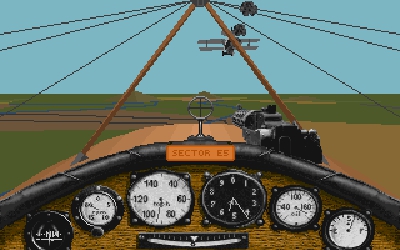
I've just torn through a novel, the first time I've done this for some time. Three Cheers for Me is the first of a series of comedy novels about a Canadian flier in WWI. The Bandy Papers series is sort of a combination of Wodehouse's Bertie Wooster and W.E. Johns' Bigglesworth, goofy social novels, uniquely Canadian, with the protagonist flying about in a Camel. I plan on getting the next couple of novels (until the end of the Great War) at least.
And it's time, past time, to get my shorts back out on the market. I've got a number of shorts that have not sold, that I think can sell, but haven't had the time or inclination to put out there. I'm thinking about saving "Nicaragua 1986" for Shroud magazine, partially because I want to appear under the same cover as Brain keene. But "Three Dreams" "Too Short For an Angel" and "Ultra-Fast Delivery" all need to get sold.
That said, I got both short stories off, (one has already been accepted, but it's Sekrut until I am given the green light). With those done, I was thinking about writingt a story for Cthulhurotica II, but I've just been itching to get back to the novel I put down a year and a half ago. And yes, it's bad to stop writing a novel, but I was back in school and all of my time and much of my brain was eaten by Chemistry.
I love writing this novel. I started it because I overall dislike its genre, and decided to find a way to make it my own. Could I write a novel about something I didn't love? The answer, at 57,000 words, is yes. And novels give the writer a chance to breathe, to expand on their ideas, keeping an eye on the pace, but without the intensive crunch and relentless word-counting of short stories. I still like writing shorts, but there's a liberty to a novel that lets me really develop character and plant foreshadowing and become very complex. Of course, I'll have to sell said novel, and that'll be a good indicator as to whether I was successful.
I've been having fun (and a bit of frustration) with the 20-year old Red Baron game. My reviews of pre-1990 WWI flight games are all done, and I'm wondering if I should blog them, or just make a new section of my website. Unfortunately, playing and writing about premodern flight sims is scratching my nonfiction writing itch, which is cutting into my blogging.

I've just torn through a novel, the first time I've done this for some time. Three Cheers for Me is the first of a series of comedy novels about a Canadian flier in WWI. The Bandy Papers series is sort of a combination of Wodehouse's Bertie Wooster and W.E. Johns' Bigglesworth, goofy social novels, uniquely Canadian, with the protagonist flying about in a Camel. I plan on getting the next couple of novels (until the end of the Great War) at least.
And it's time, past time, to get my shorts back out on the market. I've got a number of shorts that have not sold, that I think can sell, but haven't had the time or inclination to put out there. I'm thinking about saving "Nicaragua 1986" for Shroud magazine, partially because I want to appear under the same cover as Brain keene. But "Three Dreams" "Too Short For an Angel" and "Ultra-Fast Delivery" all need to get sold.
Thursday, May 17, 2012
We Will Only Pass This Way Once...
If you've got sharp eyes and pay attnetion to details, you will notice that there's a story in the 'published' section of this blog that is not on my web page. "Death on the American Family Farm" was sold to Undead Press's anthology Book of the Dead, one of several presses run by Anthony Giangregorio. Anthony has been at the center of some controversy recently, and I think it's time I weighed in on this.
The critics, including Brian Keene, Nick Mamatas, and several people who Anthony has bought stories from, are right. Undead press and Anthony Giangregorio are ignorant, unethical publishers that I wouldn't to go near if they offered ten cents a word.
Ultimately, this is my own damn fault. I was just starting out, I was looking for a sale to boost my ego, so I sent a story off to a penny-a-word publication. And I got in. And that was the beginning of my trouble.
Giangregorio called me. On the phone. Helpful hint to gentle readers; if you have Brooklyn accent, people will already thing you're a used-car salesman. Trying to hustle them by asking if they have any other stories is a big put-off. So when he asked, I said I didn't. Which was a lie, but I felt like I was getting hustled. Which, it turned out, I was.
The Book of the Dead was published, and immediately came under attack. In those days, I hung out at the Shocklines forum, where a lot of horror professionals (and a few schmucks) talk shop. John Skipp, co-edtor of the seminal 80's Book of the Dead objected to Undead Press's use of his title. Like a real pro, Giangregorio got defensive, pointing out that you cannot copyright a title, and was really rude to the person he claimed the anthology was an homage to (See Nick Mamatas' documentation of this on his blog.
A few days later, it came to light that Giangregorio had used characters from the Dawn of the Dead, which is an enormous copyright no-no, and also completely frikking stupid.
I don't think that the illustrious Mr.Giangregorio messed with my story, but by the time I had one in my hands, I was already too embarassed to read it. I have a single copy, and it's not even in my personal collection of my work. I won't give him a blessed dime. It seems like he's getting worse, no longer content to merely suck, he's inserting bestiality and bad grammar into stories he's bought. See Brain Keene's blog for this sack of crap.
Be smart. Know your publisher, and if somethig smells fishy, it probably is. The reek of something like this is very hard to wash off, even if everyone else has forgotten about it.
Now, let's never talk about this again.
The critics, including Brian Keene, Nick Mamatas, and several people who Anthony has bought stories from, are right. Undead press and Anthony Giangregorio are ignorant, unethical publishers that I wouldn't to go near if they offered ten cents a word.
Ultimately, this is my own damn fault. I was just starting out, I was looking for a sale to boost my ego, so I sent a story off to a penny-a-word publication. And I got in. And that was the beginning of my trouble.
Giangregorio called me. On the phone. Helpful hint to gentle readers; if you have Brooklyn accent, people will already thing you're a used-car salesman. Trying to hustle them by asking if they have any other stories is a big put-off. So when he asked, I said I didn't. Which was a lie, but I felt like I was getting hustled. Which, it turned out, I was.
The Book of the Dead was published, and immediately came under attack. In those days, I hung out at the Shocklines forum, where a lot of horror professionals (and a few schmucks) talk shop. John Skipp, co-edtor of the seminal 80's Book of the Dead objected to Undead Press's use of his title. Like a real pro, Giangregorio got defensive, pointing out that you cannot copyright a title, and was really rude to the person he claimed the anthology was an homage to (See Nick Mamatas' documentation of this on his blog.
A few days later, it came to light that Giangregorio had used characters from the Dawn of the Dead, which is an enormous copyright no-no, and also completely frikking stupid.
I don't think that the illustrious Mr.Giangregorio messed with my story, but by the time I had one in my hands, I was already too embarassed to read it. I have a single copy, and it's not even in my personal collection of my work. I won't give him a blessed dime. It seems like he's getting worse, no longer content to merely suck, he's inserting bestiality and bad grammar into stories he's bought. See Brain Keene's blog for this sack of crap.
Be smart. Know your publisher, and if somethig smells fishy, it probably is. The reek of something like this is very hard to wash off, even if everyone else has forgotten about it.
Now, let's never talk about this again.
Labels:
errors,
Keene,
Mamatas,
politeness,
words under covers,
writing
Monday, May 14, 2012
The Learning Curve...
It's a known fact that the Sopwith Camel killed more pilots in trainng than were shot down flying it. And I've just spend an hour and a half training to learn a tempermental, difficult-to-fly biplane. And this is what is referred to as a steep learning curve. NO, I didn't crash these planes deliberately for the picture. YES, I'm still playing on novice.
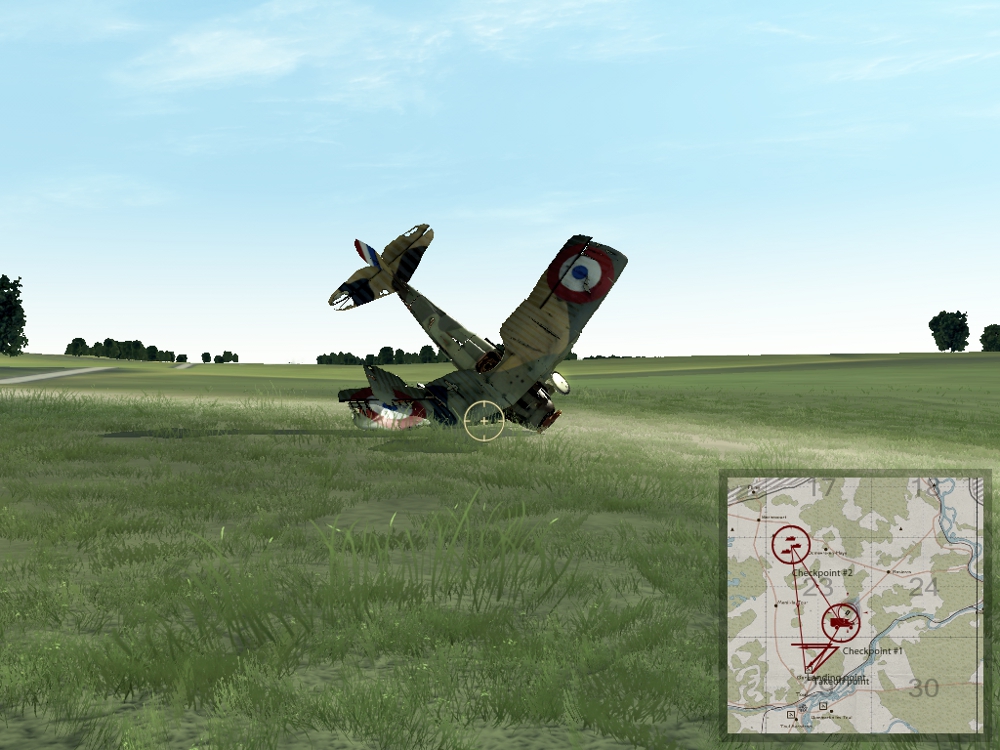
Failure to pull up after a strafing run.
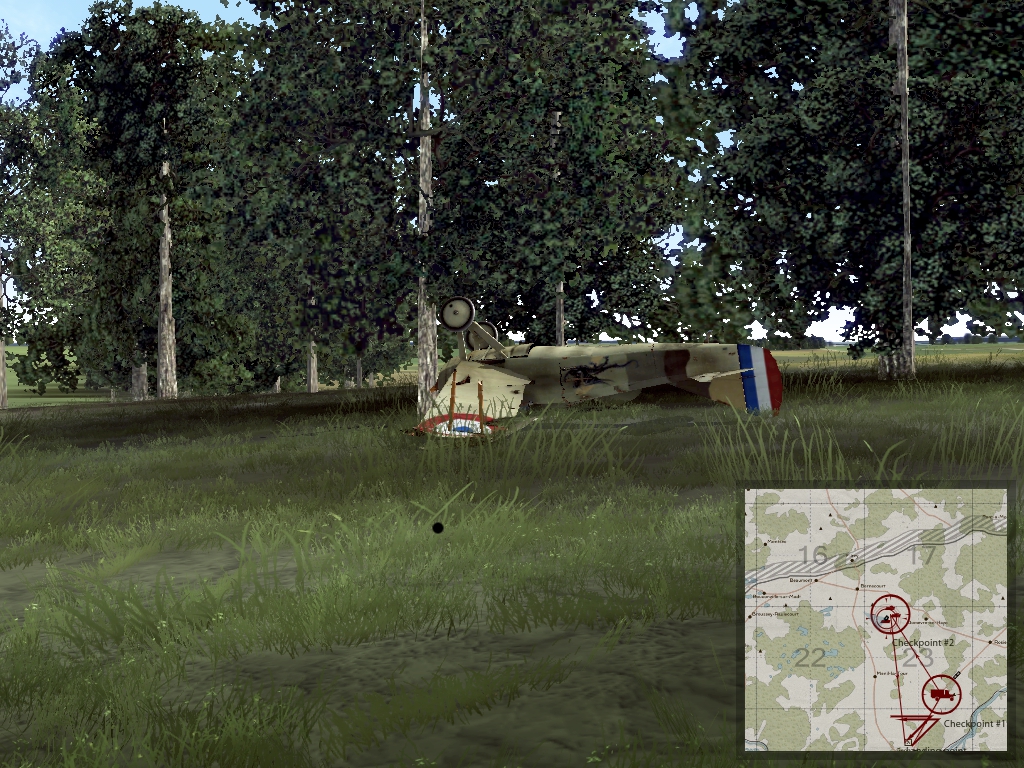
Thwacking a tree during a low-level strafe.

What happens when I fail to gain altitude during take off.
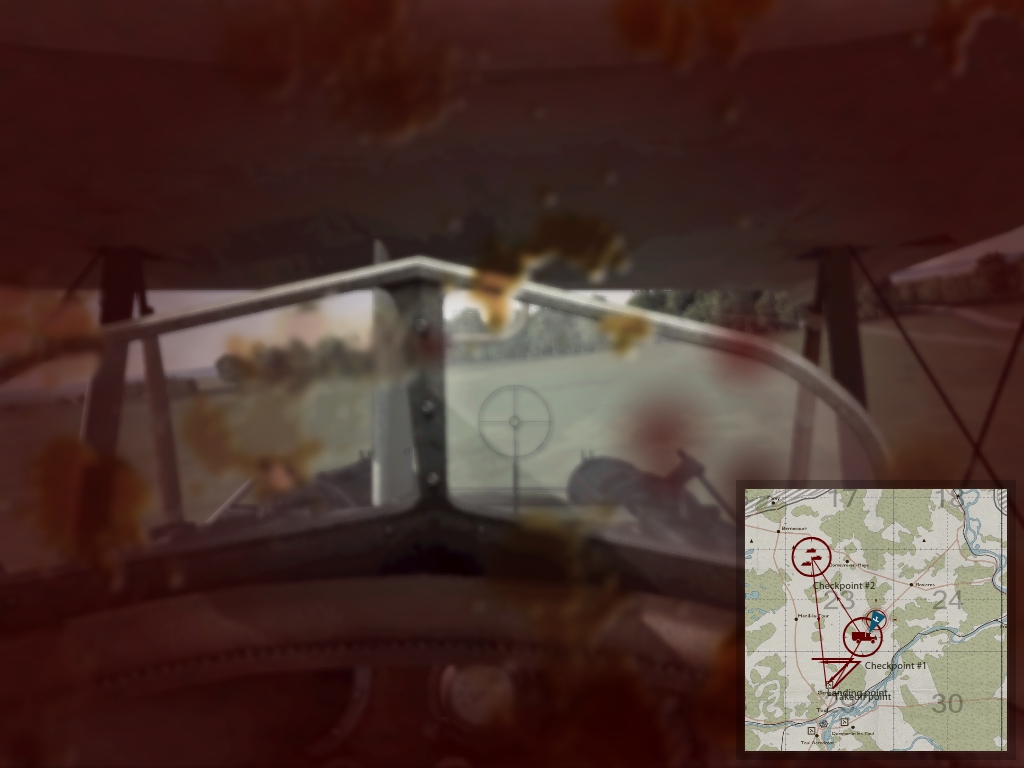
What it looked like inside the cockpit about half a second before...

I concentrated too much on the target, not enough on my altitude.

This is what happens when I overconpensate for the engine's radial precession.

For this one, I tried to take off before I really had enough speed for sufficient lift.

Failure to gain altitude over hangar.

Rocking the plane too much on take off damages the wings.
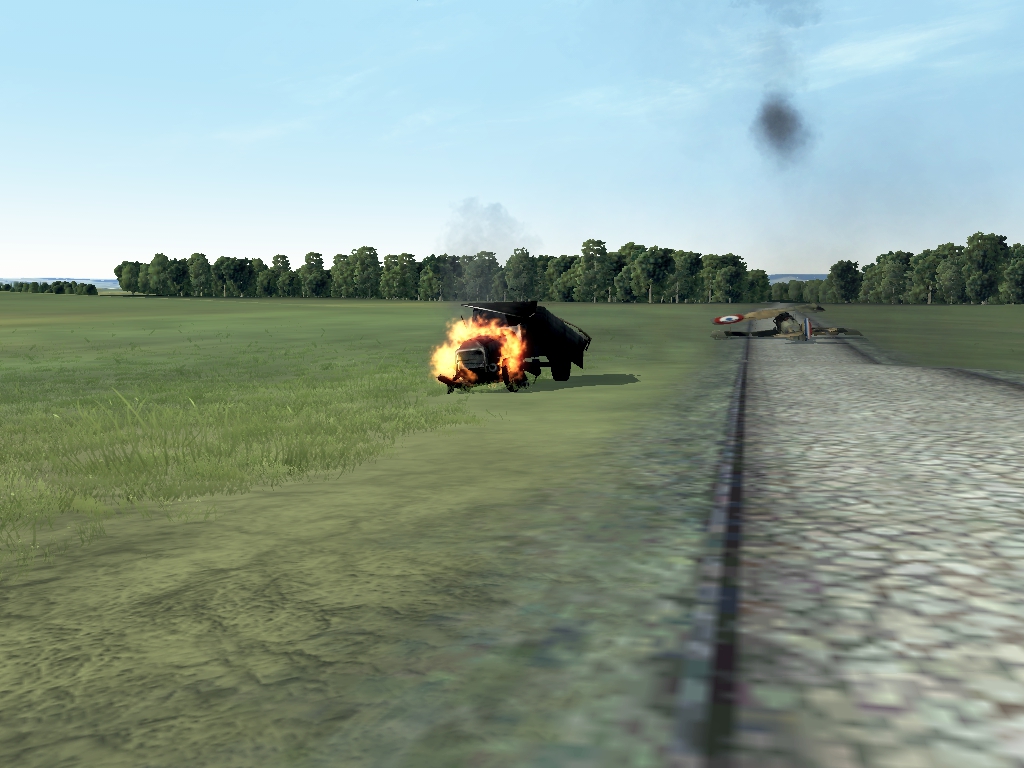
Target Destroyed! But it turns out I have difficulty recovering the plane if I'm ground-strafing from ground level.

Failure to pull up after a strafing run.

Thwacking a tree during a low-level strafe.

What happens when I fail to gain altitude during take off.

What it looked like inside the cockpit about half a second before...

I concentrated too much on the target, not enough on my altitude.

This is what happens when I overconpensate for the engine's radial precession.

For this one, I tried to take off before I really had enough speed for sufficient lift.

Failure to gain altitude over hangar.

Rocking the plane too much on take off damages the wings.

Target Destroyed! But it turns out I have difficulty recovering the plane if I'm ground-strafing from ground level.
It's An Accurate Flight Simulator...
I can tell because I've crashed about five times in each of the training missions. I'm getting the hang of dealing with the radial precession of a rotary engine, so I've made a couple of really good take-offs. Far more often, I wheel madly around the runway, desperately overcompensating to the turns my crate is making. It's not pretty.

The difference between a flight sim and a flight game is that the sim gives you the plane, warts and all. With modern computer speed and detailed programming, the particular quirks of the aircraft (like shedding its wings in a steep dive) are now being accurately simulated. The flight sim is therefore much more difficult to master, but this also makes it more rewarding in the long run. But right now, I'm at the bottom of the learning curve... and that means a lot of crashing.

The difference between a flight sim and a flight game is that the sim gives you the plane, warts and all. With modern computer speed and detailed programming, the particular quirks of the aircraft (like shedding its wings in a steep dive) are now being accurately simulated. The flight sim is therefore much more difficult to master, but this also makes it more rewarding in the long run. But right now, I'm at the bottom of the learning curve... and that means a lot of crashing.
Monday, May 7, 2012
Tuesday, May 1, 2012
Confessing Another Obsession
I've shared, or perhaps inflicted a number of my obsessions on this blog: Godzilla, Lovecraft, Ancient Egypt, necromancy, The Tomb of Horrors. These are the subjects that I return to again and again. I'm not sure why. I think everyone has these odd little things that they just like for reasons that are buried deep in their psyche.
If you've read my fiction, you'll notice that I have a thing for WWI flight. Open-cockpit flying, the time part of the danger of flight was that your plane might shed its wings. Biplane flight is beautiful. It doesn't isolate you from the fact that you're flying. I don't know where I picked up this particular twist in my psyche, but I've taken several rides in airplanes older than my parents, and loved each one. But that's expensive and inconvenient. When I want to get that feel of flight, I turn to WWI flight sims.
I'm lucky in my obsessions. They're pretty obscure. Whereas there will be several WWII or jet flight sims or games put out in a year, dedicated WWI flight sims tend to be few and far between. Because I obsess about this sort of stuff, I collect them. Old WWI flight sims, new WWI flight sims, the different editions of the same flight sim. I love cataloging them, writing about their differences, analyzing the way the genre has developed and changed.
I was, for example, ecstatic when, in 2005, Atari released their early arcade games on PC. At last, I could play the original Red Baron again!

At the same time, I'm keeping up with the most recent WWI flight sims, such as 777 Studio's Rise of Flight, which is quite astonishing in its detail.

There have been a large number of these sims since 1981. I count about 70. Luckily, a lot of them are out of print or were unpopular, so for less than $20, I can acquire an older piece of software with what are often some very nice manuals. With DOSBOX, I can now play the majority of these. For example, I've acquired Cosmi's War Eagles, which is just about the oldest WWI game I can find for the PC. It came on a 5.25 inch diskette. Remember those?
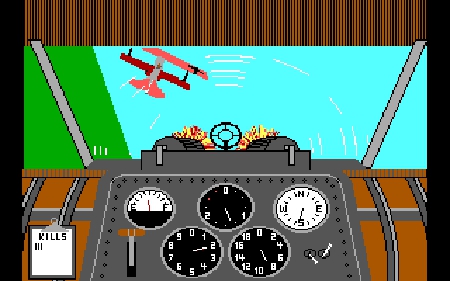
The internet, especially Ebay and Amazon, have been extremely helpful in discovering and locating these older games, especially the really weird and obscure titles like Manfred von Krashenbern’s Flying Circus. And it's really a chuckle to watch these bundles of polygons that the brain somehow translates into flying planes.
Everybody has their little quirks, and this is one of my perennials. Sometimes, I won't touch a flight sim for a year, but I've always come back to them. And I love them all, from the prmitive to the goofy (Red Baron Pizza included a free flight sim in some of their pizzas in 2004. It's hilarious!) to the unforgiving modern sim.
If you've read my fiction, you'll notice that I have a thing for WWI flight. Open-cockpit flying, the time part of the danger of flight was that your plane might shed its wings. Biplane flight is beautiful. It doesn't isolate you from the fact that you're flying. I don't know where I picked up this particular twist in my psyche, but I've taken several rides in airplanes older than my parents, and loved each one. But that's expensive and inconvenient. When I want to get that feel of flight, I turn to WWI flight sims.
I'm lucky in my obsessions. They're pretty obscure. Whereas there will be several WWII or jet flight sims or games put out in a year, dedicated WWI flight sims tend to be few and far between. Because I obsess about this sort of stuff, I collect them. Old WWI flight sims, new WWI flight sims, the different editions of the same flight sim. I love cataloging them, writing about their differences, analyzing the way the genre has developed and changed.
I was, for example, ecstatic when, in 2005, Atari released their early arcade games on PC. At last, I could play the original Red Baron again!

At the same time, I'm keeping up with the most recent WWI flight sims, such as 777 Studio's Rise of Flight, which is quite astonishing in its detail.

There have been a large number of these sims since 1981. I count about 70. Luckily, a lot of them are out of print or were unpopular, so for less than $20, I can acquire an older piece of software with what are often some very nice manuals. With DOSBOX, I can now play the majority of these. For example, I've acquired Cosmi's War Eagles, which is just about the oldest WWI game I can find for the PC. It came on a 5.25 inch diskette. Remember those?

The internet, especially Ebay and Amazon, have been extremely helpful in discovering and locating these older games, especially the really weird and obscure titles like Manfred von Krashenbern’s Flying Circus. And it's really a chuckle to watch these bundles of polygons that the brain somehow translates into flying planes.
Everybody has their little quirks, and this is one of my perennials. Sometimes, I won't touch a flight sim for a year, but I've always come back to them. And I love them all, from the prmitive to the goofy (Red Baron Pizza included a free flight sim in some of their pizzas in 2004. It's hilarious!) to the unforgiving modern sim.
Monday, April 23, 2012
Message Received by Battle Barge Glad of War, in service of the Rune Bearers chapter of the Adeptus Astartes;
My Lord Grettir;
Since my last missive, Splinter Fleet Mordiggian, once considered a small and worthy of little notice, has shown a cancerous growth, and many of the more frightening genus of Tyranid have spontaneously arisen within its ranks.
Thanks to Inquisitor Kryptmann’s gambit, this Splinter Fleet spends much of its time combating the Orks. Many clashes have been witness by out remote seers, and with the preponderance of the genestealer genus. While I do not favor either side, for both are xeno abominations which must be purged from the galaxy, it is frightening to report that many Orks have fallen to the genestealers claws, and that this causes me to worry that about wisdom of Kryptmann. If this splinter fleet unlocks the secrets of Ork fury or adds the Orks’ instinctive craftiness to the Tyranids already formidable combat arsenal, I fear for the existence of the Imperium, especially as the splinter fleet has begun the process of autologous diversification, as seen on the Anphelion base. A trygon has emerged where there was none before, as have tervigon specimens, which would account for the rapid increase in the number of termagants that the splinter fleet is able to bring to bear.
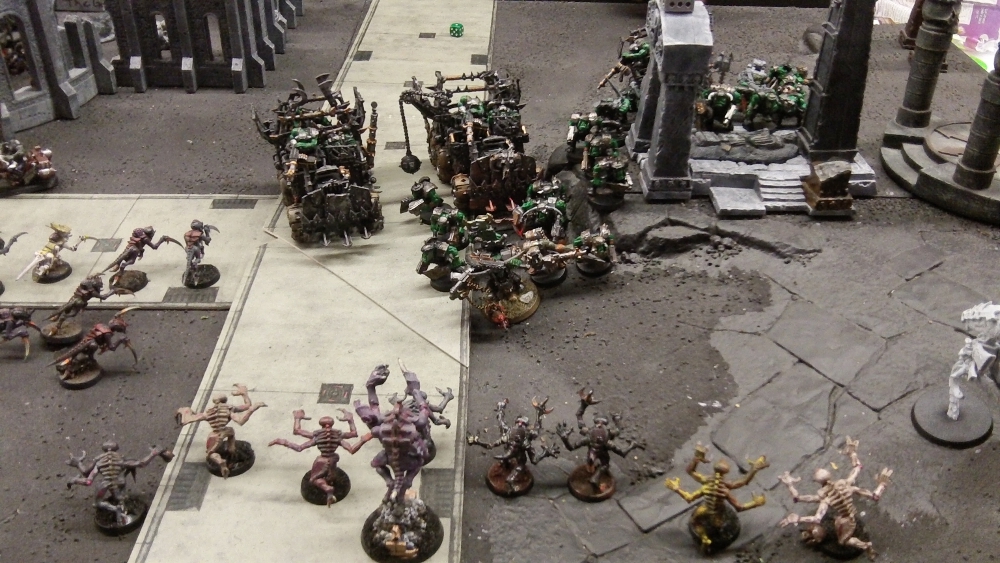
More disturbing it the emergence of Mordiggian’s first Hive Tyrant, seen here with a tyrant guard and zoanthrope just before it destroyed a large number of Ork nob bikers. The terrified astropath that viewed the emergence of the tyranid monstrosity died of fright after transmitting this picture. The terror and destruction that this horror brings with it cannot be underestimated.
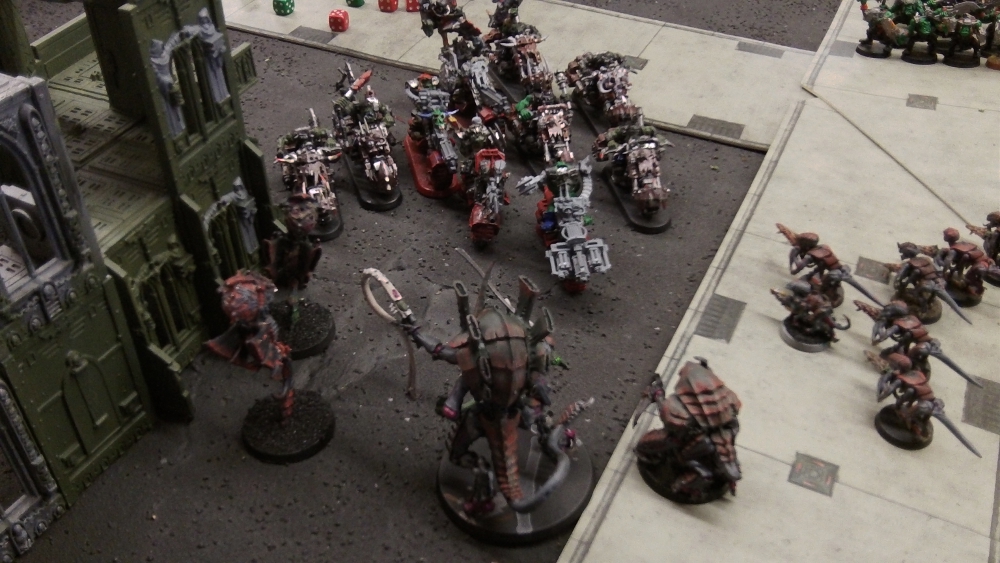
The greatest setback experienced by Mordiggian was an encounter with the Blood Angels, seen here as a brood of zoanthropes attempt to conceal themselves from the Blood Angel Thunderhawk under the strange and undoubtedly warp-tainted skies of skies of Stromsholt. Though defeated, the splinter fleet was not exterminated, and the menace has emerged again, like a disease or destructive weed, from another quarter.
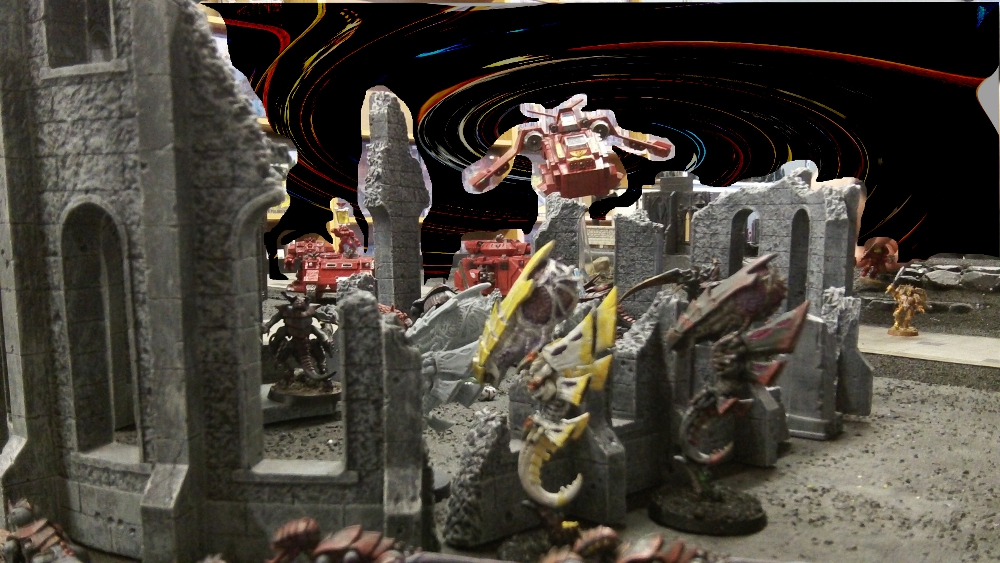
Most recently, the splinter fleet has been seen to use mycetic spores, living meteors which, once grounded, pour forth countless termagants, which in turn pour death into an unidentified Space Marine chapter seen here.
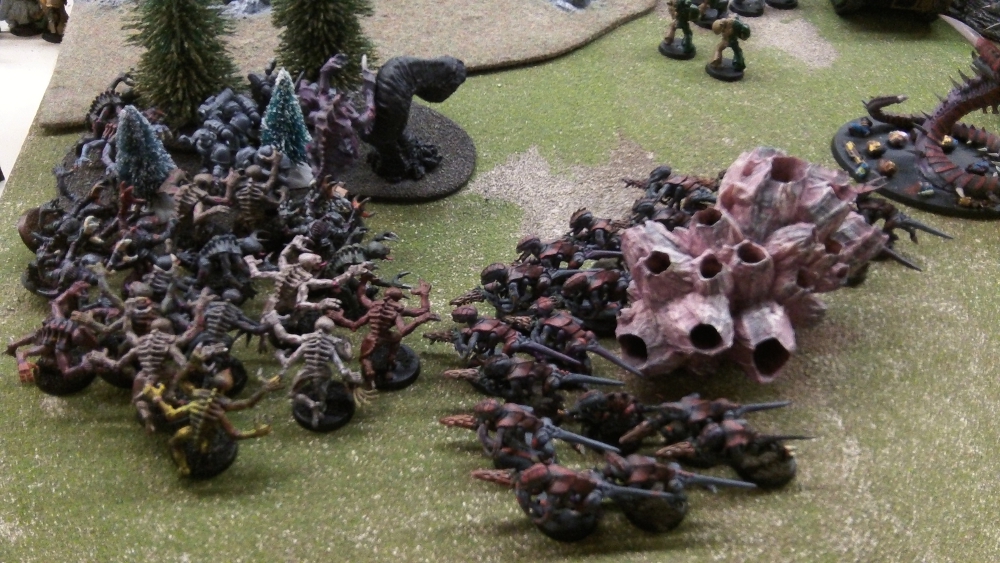
This hive grows at a frightening rate, and I have no wish to be present if it turns its attentions to Eorthscraef, or any of our sector. Once again I humbly beg that the Rune Bearers dispatch a contingent of their extraordinary warriors to exterminate this peril before the lives of more Imperial citizens are endangered, their property destroyed, and their usefulness to the Emperor crippled or eliminated altogether. We shall, of course, defer to whatever judgement your worthiness decrees.
May the Holy Emperor guide your hand in delivering us from this frightful menace,
Johann of Eorthscraef
Since my last missive, Splinter Fleet Mordiggian, once considered a small and worthy of little notice, has shown a cancerous growth, and many of the more frightening genus of Tyranid have spontaneously arisen within its ranks.
Thanks to Inquisitor Kryptmann’s gambit, this Splinter Fleet spends much of its time combating the Orks. Many clashes have been witness by out remote seers, and with the preponderance of the genestealer genus. While I do not favor either side, for both are xeno abominations which must be purged from the galaxy, it is frightening to report that many Orks have fallen to the genestealers claws, and that this causes me to worry that about wisdom of Kryptmann. If this splinter fleet unlocks the secrets of Ork fury or adds the Orks’ instinctive craftiness to the Tyranids already formidable combat arsenal, I fear for the existence of the Imperium, especially as the splinter fleet has begun the process of autologous diversification, as seen on the Anphelion base. A trygon has emerged where there was none before, as have tervigon specimens, which would account for the rapid increase in the number of termagants that the splinter fleet is able to bring to bear.

More disturbing it the emergence of Mordiggian’s first Hive Tyrant, seen here with a tyrant guard and zoanthrope just before it destroyed a large number of Ork nob bikers. The terrified astropath that viewed the emergence of the tyranid monstrosity died of fright after transmitting this picture. The terror and destruction that this horror brings with it cannot be underestimated.

The greatest setback experienced by Mordiggian was an encounter with the Blood Angels, seen here as a brood of zoanthropes attempt to conceal themselves from the Blood Angel Thunderhawk under the strange and undoubtedly warp-tainted skies of skies of Stromsholt. Though defeated, the splinter fleet was not exterminated, and the menace has emerged again, like a disease or destructive weed, from another quarter.

Most recently, the splinter fleet has been seen to use mycetic spores, living meteors which, once grounded, pour forth countless termagants, which in turn pour death into an unidentified Space Marine chapter seen here.

This hive grows at a frightening rate, and I have no wish to be present if it turns its attentions to Eorthscraef, or any of our sector. Once again I humbly beg that the Rune Bearers dispatch a contingent of their extraordinary warriors to exterminate this peril before the lives of more Imperial citizens are endangered, their property destroyed, and their usefulness to the Emperor crippled or eliminated altogether. We shall, of course, defer to whatever judgement your worthiness decrees.
May the Holy Emperor guide your hand in delivering us from this frightful menace,
Johann of Eorthscraef
Monday, April 16, 2012
On The Need to Write Quickly (With Name-Dropping)
I've been solving one short story for about two and a half months. It's been a difficult struggle, but I finally put the first draft to bed last week. I have to write faster. Part of the reason I'm updating this blog more regularly (which is to say, regularly) is that I need to write every day, even on the days that I don't peck away at a story.
Because I have changed. I'm not the same person I was in February when I started this story. Allowing the process of the story to drag on so long means that the story will likely be weakened, thematically. I will no longer have the same passion for the plot and the themes that I did when it was fresh in my head. I have stared at it and been sick of it because I've been thinking and reading the same damn thing for the past two months.
Robert Asperin once said "I'm not a slow writer, and I'm not a fast writer. I'm a half-fast writer." And I have to avoid that. I'm not going to support myself with short stories, even if I write one a week. Because even at professional rates, that's (.05 x 5,000=$250 per story x 52 weeks=) $13,000 a year. Which is not liveable. But if I can learn to hammer out the prose with the short stories, I'll be able to sustain my attention for longer when I'm writing a novel. After my current story, "Tribute Band", I'm back to my novel. Which will be finished by NECON so I can ask James Moore (because hey! James Moore!) to read it, and then I'll move on to my next novel as I'm passing the current one around for publication.
A working mid-list novelist needs to sell at least two novels a year. The advance on the average mid-list novel is less than $10,000, so two novels a year is pretty well required unless I'm going to bet that I'm going to be huge. And while I can hope I'm going to be huge, I'm smart enough that I don't think I'm going to bet on it.
I've set the first draft deadline for the latest short story at the 27th. I need to get faster about my stories, because I need to ace deadlines when I'm asked to write something. Being early, and even better, getting a reputation for being early, can be an enormous asset when editors are thinking about who to invite into their anthology.
Special Thanks to Brian Keene and Walter Jon Williams for some hard truths that made this post possible.
Because I have changed. I'm not the same person I was in February when I started this story. Allowing the process of the story to drag on so long means that the story will likely be weakened, thematically. I will no longer have the same passion for the plot and the themes that I did when it was fresh in my head. I have stared at it and been sick of it because I've been thinking and reading the same damn thing for the past two months.
Robert Asperin once said "I'm not a slow writer, and I'm not a fast writer. I'm a half-fast writer." And I have to avoid that. I'm not going to support myself with short stories, even if I write one a week. Because even at professional rates, that's (.05 x 5,000=$250 per story x 52 weeks=) $13,000 a year. Which is not liveable. But if I can learn to hammer out the prose with the short stories, I'll be able to sustain my attention for longer when I'm writing a novel. After my current story, "Tribute Band", I'm back to my novel. Which will be finished by NECON so I can ask James Moore (because hey! James Moore!) to read it, and then I'll move on to my next novel as I'm passing the current one around for publication.
A working mid-list novelist needs to sell at least two novels a year. The advance on the average mid-list novel is less than $10,000, so two novels a year is pretty well required unless I'm going to bet that I'm going to be huge. And while I can hope I'm going to be huge, I'm smart enough that I don't think I'm going to bet on it.
I've set the first draft deadline for the latest short story at the 27th. I need to get faster about my stories, because I need to ace deadlines when I'm asked to write something. Being early, and even better, getting a reputation for being early, can be an enormous asset when editors are thinking about who to invite into their anthology.
Special Thanks to Brian Keene and Walter Jon Williams for some hard truths that made this post possible.
Friday, April 13, 2012
What Do You See?
What do you see when you look at someone? The neat hair, the cared-for, well moisturized skin, a quick smile? Do you see their skin color? The shape of their teeth?
I look at people a lot. Make assumptions about them from their appearance, the way they speak, how they present themselves. See the contradicitons. Neat hair with dirty nails, well cared-for skin and black stumps of teeth. I find that like stars, most people fall into a main sequence. They fall on a broad political spectrum, as well as a broad social spectrum. But generally speaking, their appearance and speech reflect this. Other details will emerge, and sometimes it's even possible to guess of someone was an only child, what sort of relationship they had with their parents. It's not a difficult skill to acquire. Just be ready to ask someone some slightly over the line personal questions to test your assumptions.
The people who don't fall into that main sequence? They tend to be more interesting. They have changed in some way, come to a life-altering apiphany, or perhaps they were raised on different assumptions than the majority of Americans. These people are often interesting to talk to, because they have a different point of view. And these people are often fodder as a protagonist.
And this sort of sociopathic picking apart of people is what my latest story “The Neighbors Upstairs” is about. Is it possible to pick someone apart using just conversation? How much of ourselves do we reveal when we talk to strangers? How are people strange, and how can our own assumptions and our frame of mind interfere with the way we view someone else?
“The Neighbors Upstairs” is available in Urban Cthulhu, Nightmare Cities, edited by Henrik Harkesn.
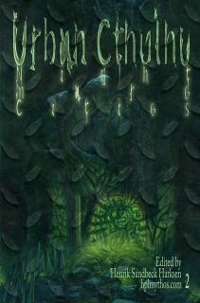
I look at people a lot. Make assumptions about them from their appearance, the way they speak, how they present themselves. See the contradicitons. Neat hair with dirty nails, well cared-for skin and black stumps of teeth. I find that like stars, most people fall into a main sequence. They fall on a broad political spectrum, as well as a broad social spectrum. But generally speaking, their appearance and speech reflect this. Other details will emerge, and sometimes it's even possible to guess of someone was an only child, what sort of relationship they had with their parents. It's not a difficult skill to acquire. Just be ready to ask someone some slightly over the line personal questions to test your assumptions.
The people who don't fall into that main sequence? They tend to be more interesting. They have changed in some way, come to a life-altering apiphany, or perhaps they were raised on different assumptions than the majority of Americans. These people are often interesting to talk to, because they have a different point of view. And these people are often fodder as a protagonist.
And this sort of sociopathic picking apart of people is what my latest story “The Neighbors Upstairs” is about. Is it possible to pick someone apart using just conversation? How much of ourselves do we reveal when we talk to strangers? How are people strange, and how can our own assumptions and our frame of mind interfere with the way we view someone else?
“The Neighbors Upstairs” is available in Urban Cthulhu, Nightmare Cities, edited by Henrik Harkesn.

Monday, April 9, 2012
Ooohhhhhhhmmmmmmmmm

Last week, some friends and I went to a locak Yoga center top see Kirshna Das in concert. Not because I am a Hindu, or even because I have ever wanted to chant the Hare Krishna, but because kirtan involves common singing. I like singing. I am, however, aware that I'm only a small step up from those tuneless bastards that grab the microphone at Guitar Hero sessions, but that gets lost when there are a couple of hundred people singing. In the same way that a mass of votes is supposed to pull wisdom from the common people, common singing pulls a bearable tune out of people who are at best mediocre singers.
But communal singing is also powerfully human. Virtually every religion on Earth practices communal singing, because it appeals to us in a social level. When we sing together, we are all part of the tribe. Our differences disappear, because we are all singing the same thing, contributing parts to a whole.
It helps that Krishna Das sings from a different tradition than the one I grew up in, so I wasn't expecting lyrics that had emotional baggage, or even a language I understood. Krishna Das performs his own aspect on the kirtan, the Hindu chanting, in a call and response fashion, the names of god, and he mixes the traditional with more familiar Western tunes and styles. This makes it more accessible to the average American.
It was a popular event, so we waited in a hallway for about forty-five minutes, watching the people who were taking their yoga classes. And I began to write the scene in my head, and then started writing it as other writers. How would Brian Keene have evoked the scene? Nick Mamatas would have used the phrase "Cultural appropriation" at the very least, and probably a couple of times. Especially after Krishna Das played "Jesus on the Main Line."
But I wasn't seeking a religious experience. I wanted to sing and ohhhm with a bunch of people. And I have to say, I had a good time doing it.
Monday, April 2, 2012
What Does My Creativity Look Like?
Where do the ideas come from? For me, the ideas tend to come when I'm in some sort of enforced not doing anytghing else period. Long car trips and the 20 minute walk to work, as well as showers, these are the times that I tend to be my most creative. Because I'm not distracted. I don't have access to all the distracting fun I have at home; playing games, reading something, watching something, Internet arguing, blogging. All of these have their place, but they're not what I want to be doing when I'm coming up with a plot, character, or twist.
So I often scribble notes down, so I can remember the ideas I had when it wasn't appropriate to sit down and write them up. As a result, my desk, and occasionally other flat surfaces, are covered with little pieces of paper that appears to have cuneiform writing on them. For example, these are the notes for my next story, provisionally titled "Tribute Band" written somewhere between Rutland and Randolph:

Which first of all says why I should never text and drive. But those scribbles will probably come out to about 1,500 words when expanded, and define the emotional heart of the story. So there it is, what my creativity looks like. A messy beginning, the 10% inspiration that leads to the 90% perspiration.
So I often scribble notes down, so I can remember the ideas I had when it wasn't appropriate to sit down and write them up. As a result, my desk, and occasionally other flat surfaces, are covered with little pieces of paper that appears to have cuneiform writing on them. For example, these are the notes for my next story, provisionally titled "Tribute Band" written somewhere between Rutland and Randolph:

Which first of all says why I should never text and drive. But those scribbles will probably come out to about 1,500 words when expanded, and define the emotional heart of the story. So there it is, what my creativity looks like. A messy beginning, the 10% inspiration that leads to the 90% perspiration.
Thursday, March 29, 2012
The What of Where?
I understand. Vermont is a small state, and we've got something of a reputation for being a pleasant place with loads of pretty untouched scenery to look at. Which is somewhat true (most of the pretty trees are second growth after many of the less-productive farms were abandoned post Civil War and WWII). But I've noticed a trend in film where Vermont is portrayed with wild inaccuracy.
I suppose I shouldn't pick on Sucker Punch for accuracy. After all, if I had a Brazil-like psychotic break and imagined the "asylum for the mentally insane" I was imprsoned in was a Moulon Rouge-style dance club/whorehouse, I probably wouldn't imagine that it was in Brattleboro.
However, the film's conceit means that the audience has to believe that this is the mayor of Brattleboro, the population of which has never exceeded 15,000.

Those of us with access to Wikipedia know that Brattleboro doesn't even have a mayor. Like a lot of towns in Vermont, it has a town manager. Not that any of the scriptwriters bothered to look it up.
Is it reasonable to expect psychotic-break girl to understand this? No. Not in a Zack Snyder film, which is all about flashy CG, explosions, and slow-motion shots, and not so much about the research. But if Zack Snyder was expecting me, or apparently audiences in general, to be shocked that the second layer of 'reality' was the 'Sucker Punch' the tag line boasted that we were unprepared for, he thinks audiences are a lot dumber than they are. Brazil prepared me. And a surprising number of people have read Ambrose Bierce's "An Occurrence at Owl Creek Bridge." If you haven't you can read it here.
Unlike Sucker Punch, the short story is worth your time.
I suppose I shouldn't pick on Sucker Punch for accuracy. After all, if I had a Brazil-like psychotic break and imagined the "asylum for the mentally insane" I was imprsoned in was a Moulon Rouge-style dance club/whorehouse, I probably wouldn't imagine that it was in Brattleboro.
However, the film's conceit means that the audience has to believe that this is the mayor of Brattleboro, the population of which has never exceeded 15,000.

Those of us with access to Wikipedia know that Brattleboro doesn't even have a mayor. Like a lot of towns in Vermont, it has a town manager. Not that any of the scriptwriters bothered to look it up.
Is it reasonable to expect psychotic-break girl to understand this? No. Not in a Zack Snyder film, which is all about flashy CG, explosions, and slow-motion shots, and not so much about the research. But if Zack Snyder was expecting me, or apparently audiences in general, to be shocked that the second layer of 'reality' was the 'Sucker Punch' the tag line boasted that we were unprepared for, he thinks audiences are a lot dumber than they are. Brazil prepared me. And a surprising number of people have read Ambrose Bierce's "An Occurrence at Owl Creek Bridge." If you haven't you can read it here.
Unlike Sucker Punch, the short story is worth your time.
Monday, March 26, 2012
Weekend, with Bernie
Generally speaking, I don't have much time for professional politicians. They get a lot of attention and make hay out of the crisis of the moment, and most will say any damn thing to get themselves into a position of power. Worse, America's two-party system (that's only one more than the Soviet style one-party system) means that in order to have any clout, said politician needs to cleave to the dogma of either the Democratic or Republican party, subsuming their own values and wishes to those of the party.

Bernie Sanders is America's only socialist Congressman. Do I support him? Let's start out by saying I find him less odious than most political creatures I've met. I believe America would be stronger if we had a broader variety of opinions represented in Congress, more parties that represented more than just the two major parties. Currently, the political parties are wagging the dog, telling people what their opinions are, rather than the other way around. This is an enormous problem.
Overall, Bernie Sanders puts on a good show. The Senator speaks well, is funny when he tries to be, and carries authority in his speech. I didn't keep notes, so I can't tell you if the numbers he quoted were accurate. But we agree on several key issues; the need for universal health care, the destruction of corporate personhood, LGBQT rights, the need to improve education, and the need for governmental protection of the environment.
I voted for Mr. Sanders in the last election, because his opponent was a knucklehead who thought Vermont was easily bought. Unless I get a compelling reason not to, I'm likely to vote for Sanders again this year. His stated values and voting record stand closer to my own values than the platforms of either major political party.

Bernie Sanders is America's only socialist Congressman. Do I support him? Let's start out by saying I find him less odious than most political creatures I've met. I believe America would be stronger if we had a broader variety of opinions represented in Congress, more parties that represented more than just the two major parties. Currently, the political parties are wagging the dog, telling people what their opinions are, rather than the other way around. This is an enormous problem.
Overall, Bernie Sanders puts on a good show. The Senator speaks well, is funny when he tries to be, and carries authority in his speech. I didn't keep notes, so I can't tell you if the numbers he quoted were accurate. But we agree on several key issues; the need for universal health care, the destruction of corporate personhood, LGBQT rights, the need to improve education, and the need for governmental protection of the environment.
I voted for Mr. Sanders in the last election, because his opponent was a knucklehead who thought Vermont was easily bought. Unless I get a compelling reason not to, I'm likely to vote for Sanders again this year. His stated values and voting record stand closer to my own values than the platforms of either major political party.
Friday, March 23, 2012
Comics and Superheroes
I am pretty selective about the comics I read. I've got eleven long boxes full of comics, and in going through them I've noticed something. I don't like superhero comics.
In fact, I don't like superheroes at all.
The difference between a auperhero and a regular hero is that the superhero is born with their difference from the rest of humanity. They were born special, and often the book is about using that specialness in a non-selfish fashion. But you can't aspire to be Superman. No one was born on Krypton, so no matter how hard you try, you can't fly. Even if you wear the cape.
The comics I have read tend to have more human. Grimjack, Hellblazer, Bone, Castle Waiting, Grendel and Jonah Hex. All of these feature protagonsts who are normal, but not average, humans.
There are exceptions, of course. I've got Mage, Swamp Thing, Hellboy, Girl Genius, and the occasional Batman trade. You don't think Batman was born with powers beyond that or mere mortals? Where would he be without Wayne Enterprises? WOuld Batman be half as effective if he was not ridiculously wealthy and able to afford the Batwing, the Batmobile, and all those other gadgets?
But when I look at patterns, especially in myself, I wonder about the exceptions. Despite the above sentence, Batman is often closer to being a hero than a superhero. When he is being written as the Darknight Detective and investgating crimes, I'm a lot more interested.
But what about Hellboy attracts me? Alan Moore's Swamp Thing and Phil Foglio's Girl Genius are both brilliantly written, transcending the usual tropes of the superhero genre, and Mage is a rather tasty modernization of the Arthur stories, which I've long enjoyed.
So why Hellboy?
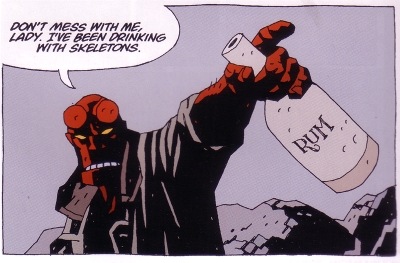
The short answer is because it's awesome.
Hellboy is an exception to the usual superhero tropes. Yes, he's stronger and tougher than the average human, but it's important to note that he was born to destroy the world. Think about that for a moment. He was born to bring about the death of everyone he knows, to split the world and open the way for the apocalypse. That's kind of heavy.
What makes Hellboy such a good character is that as he becomes aware of his "birthright," he intensifies his fight against it. He will not be defined by his birth. He will be himself, not play the role that someone else handed him. The underlying thrust of the series, shot through with stories of killing Nazis, dragons, and trolls, is the growung realization that he is defying his so-called desting and taking his own path. That journey, the personal one, is worth more of my time than a hundred pages of beating up supervillains.
In fact, I don't like superheroes at all.
The difference between a auperhero and a regular hero is that the superhero is born with their difference from the rest of humanity. They were born special, and often the book is about using that specialness in a non-selfish fashion. But you can't aspire to be Superman. No one was born on Krypton, so no matter how hard you try, you can't fly. Even if you wear the cape.
The comics I have read tend to have more human. Grimjack, Hellblazer, Bone, Castle Waiting, Grendel and Jonah Hex. All of these feature protagonsts who are normal, but not average, humans.
There are exceptions, of course. I've got Mage, Swamp Thing, Hellboy, Girl Genius, and the occasional Batman trade. You don't think Batman was born with powers beyond that or mere mortals? Where would he be without Wayne Enterprises? WOuld Batman be half as effective if he was not ridiculously wealthy and able to afford the Batwing, the Batmobile, and all those other gadgets?
But when I look at patterns, especially in myself, I wonder about the exceptions. Despite the above sentence, Batman is often closer to being a hero than a superhero. When he is being written as the Darknight Detective and investgating crimes, I'm a lot more interested.
But what about Hellboy attracts me? Alan Moore's Swamp Thing and Phil Foglio's Girl Genius are both brilliantly written, transcending the usual tropes of the superhero genre, and Mage is a rather tasty modernization of the Arthur stories, which I've long enjoyed.
So why Hellboy?

The short answer is because it's awesome.
Hellboy is an exception to the usual superhero tropes. Yes, he's stronger and tougher than the average human, but it's important to note that he was born to destroy the world. Think about that for a moment. He was born to bring about the death of everyone he knows, to split the world and open the way for the apocalypse. That's kind of heavy.
What makes Hellboy such a good character is that as he becomes aware of his "birthright," he intensifies his fight against it. He will not be defined by his birth. He will be himself, not play the role that someone else handed him. The underlying thrust of the series, shot through with stories of killing Nazis, dragons, and trolls, is the growung realization that he is defying his so-called desting and taking his own path. That journey, the personal one, is worth more of my time than a hundred pages of beating up supervillains.
Labels:
reading,
The Masters,
the myths we tell ourselves
Monday, March 19, 2012
Tim Powers: Master of the Craft, Builder of Worlds
Last week Tim Powers latest book came out. There's two people I buy the hardcover of, and Powers is one of them. Hide Me Among the Graves, is next on my reading list (when the Queen of Science is done).
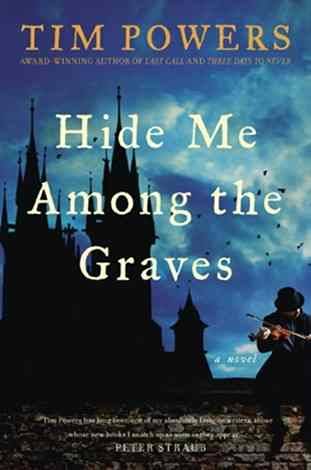
Tim Powers is the guy who ruined Harry Pottter for me. He is one of the pre-emminent world-builders working in fiction today. When he creates magic, or magical effects, they are strange and quirky, but they follow a consistent set of rules. There is no magic of convenience, something that the characters can do because it makes the plot easier, or worse, make the plot happen. Even Charles Stross can't avoid a little magic of convenience; it makes the plotting a little bit easier, covers up gaps the writer doesn't want to explore.
Powers is a master of prose, but he's also the real father of the mashup novel. In his books, the most unlikely things collide, and as you progress further into the book, it all begins to makse sense. His novel Last Call is a wonderful, frightening wreck in which the train of King Arthur mythology rams headlong into the gaudily-decorated van that is Las Vegas. And I couldn't look away.
And how completely MAD is it to combine bitter cold war John Lecarre spying with Arabic genies? But Powers takes this conceit, james it in a blender with the life of Kim Philby, and builds up all these very strange connections into a real slam-you-out-of-nowhere climax that works because you understand how the magic works. Powers has sucked you into his world, and you begin to see things through what he describes as his 'paranoid hat.'
What makes Powers books so compelling is that it has weird little implications his magic system provides. Magic is not simple, but it is goverened by rules, and the exploration if the implications of those rules is fascinating. Humans are, by nature, rules-gamers. We will try to get away with what we can within whatever rule set we establish. Watch politics and business interact some day and you'll see what I mean. So it stands to reason that humans who discover that there is magic in the world will try to push its boundaries, just to see how far they can go.
So it's not just that Tim Powers writes brilliant prose with compelling characters. His work is pretty much unique in its world-building and his exploration of the strangeness of his rules of magic. And it's brilliant.
Meeting Tim Powers was a major contributing factor to me writing. He a brilliant conversationalist. I thought "I want a job where my co-workers are like him." There are three ways to have frequent encounters with writers; be wealthy, be a publisher, or be a writer. I opted for number three, and I have met an enormous number of wonderful writers. Thank you, Mr. Powers, for openning two worlds to me.

Tim Powers is the guy who ruined Harry Pottter for me. He is one of the pre-emminent world-builders working in fiction today. When he creates magic, or magical effects, they are strange and quirky, but they follow a consistent set of rules. There is no magic of convenience, something that the characters can do because it makes the plot easier, or worse, make the plot happen. Even Charles Stross can't avoid a little magic of convenience; it makes the plotting a little bit easier, covers up gaps the writer doesn't want to explore.
Powers is a master of prose, but he's also the real father of the mashup novel. In his books, the most unlikely things collide, and as you progress further into the book, it all begins to makse sense. His novel Last Call is a wonderful, frightening wreck in which the train of King Arthur mythology rams headlong into the gaudily-decorated van that is Las Vegas. And I couldn't look away.
And how completely MAD is it to combine bitter cold war John Lecarre spying with Arabic genies? But Powers takes this conceit, james it in a blender with the life of Kim Philby, and builds up all these very strange connections into a real slam-you-out-of-nowhere climax that works because you understand how the magic works. Powers has sucked you into his world, and you begin to see things through what he describes as his 'paranoid hat.'
What makes Powers books so compelling is that it has weird little implications his magic system provides. Magic is not simple, but it is goverened by rules, and the exploration if the implications of those rules is fascinating. Humans are, by nature, rules-gamers. We will try to get away with what we can within whatever rule set we establish. Watch politics and business interact some day and you'll see what I mean. So it stands to reason that humans who discover that there is magic in the world will try to push its boundaries, just to see how far they can go.
So it's not just that Tim Powers writes brilliant prose with compelling characters. His work is pretty much unique in its world-building and his exploration of the strangeness of his rules of magic. And it's brilliant.
Meeting Tim Powers was a major contributing factor to me writing. He a brilliant conversationalist. I thought "I want a job where my co-workers are like him." There are three ways to have frequent encounters with writers; be wealthy, be a publisher, or be a writer. I opted for number three, and I have met an enormous number of wonderful writers. Thank you, Mr. Powers, for openning two worlds to me.
Friday, March 16, 2012
Metatext is Its Own Reward
I love text (and I'm using the term "text": to refer to any work, film, book, comic, or piece of music) that reveals more about a text that I like. I am an enormous sucker for extras on DVDs, and expecially IMDB's trivia section. Because if something was good, then I'm interested in learning something about the process of what created it. How did it get to be that way?
Case in point, Wilum Pugmire's Sesqua Valley and Other Haunts. He provides an afterward for each story. Sometimes they provide the origin of the story, sometimes the intended effect, sometimes just random stuff about the process of creating the story. For me, each of these is a little story in and of itself, a light touch that lets me see the mind behind the creation. I like to think ir brings me closer to understanding Wilum.
Maybe it's the scholar in me, who wants to take something good apart and see what makes it tick. But there's also the glutton that wants to recapture that feeling of something I've already enjoyed, and delving into something I already like means I don't have to go looking for something new.
Because I like people, and I especilly like creative people. I've regretted delving into the creation of something I love only once, and that was Kinka Usher's director's commentary on Mystery Men, in which he revealed himself to be a shallow, purelie person whose contribution to the film was overshadowed by a stellar cast, excellent set design, and good editing.
Case in point, Wilum Pugmire's Sesqua Valley and Other Haunts. He provides an afterward for each story. Sometimes they provide the origin of the story, sometimes the intended effect, sometimes just random stuff about the process of creating the story. For me, each of these is a little story in and of itself, a light touch that lets me see the mind behind the creation. I like to think ir brings me closer to understanding Wilum.
Maybe it's the scholar in me, who wants to take something good apart and see what makes it tick. But there's also the glutton that wants to recapture that feeling of something I've already enjoyed, and delving into something I already like means I don't have to go looking for something new.
Because I like people, and I especilly like creative people. I've regretted delving into the creation of something I love only once, and that was Kinka Usher's director's commentary on Mystery Men, in which he revealed himself to be a shallow, purelie person whose contribution to the film was overshadowed by a stellar cast, excellent set design, and good editing.
Thursday, March 15, 2012
Towards a New Atheism
I recently quit a message board I had belonged to for close to a decade because of the religious arguments. With some irony I'll state that it was my fellow atheists who drove me away with their condescention and intolerance. You know; those traits that atheists most often ascribe to the religious.
I want a new movement in atheism. One that is not 'angry' at god or church, one that is not condescending, one that can speak without rancor or snark with those who believe in God. When Christopher Hitchens titles a chapter of God is Not Great "Is Religion Child Abuse?" he is clearly preaching to the choir and not interested in any sort of discussion. How can we establish a meaningful dialog with our neighbors if we do not respect them? Are we so certain of our purpose that we cannot even allow people to practice as they wish? That we must tear them down when discussing religion? Because zeal and fanaticism like that might be mistaken for a crusade.
Now, I'm not against rigorous discussion and even argument when necessary. That's fine. But it would be nice if it could be done without the words idiot, fool, stupid, or ignorant getting thrown around so liberally. Because that's exactly what intolerant people do, and if you adopt their play book, you are one and the same with the religious intolerant.
If we cannot respect religions, then is our intent to destroy them? Mine certainly is not. I believe the vast majority of religious folk work quietly toward what good they can. The loud-mouthed are not the majority, and not representative of any group as a whole. It is my firm belief that religion helps people to live better lives. The accusation that it does not seems to come most often from atheists who have not contributed to a charity in years.
And ultimately, it doesn't matter. We have our lives, and then we are dead. If we are right and there is no afterlife, and no one will be able to gloat over anyone. And that's the joke, isn't it? Atheists seem to believe themselves somehow stonger because they live without the 'crutch' of religion (I do not believe religion is a crutch, but that's a discussion for another time). But if the religious are good people and happier durng their lifetimes than atheists, well the joke's on us.
I want a new movement in atheism. One that is not 'angry' at god or church, one that is not condescending, one that can speak without rancor or snark with those who believe in God. When Christopher Hitchens titles a chapter of God is Not Great "Is Religion Child Abuse?" he is clearly preaching to the choir and not interested in any sort of discussion. How can we establish a meaningful dialog with our neighbors if we do not respect them? Are we so certain of our purpose that we cannot even allow people to practice as they wish? That we must tear them down when discussing religion? Because zeal and fanaticism like that might be mistaken for a crusade.
Now, I'm not against rigorous discussion and even argument when necessary. That's fine. But it would be nice if it could be done without the words idiot, fool, stupid, or ignorant getting thrown around so liberally. Because that's exactly what intolerant people do, and if you adopt their play book, you are one and the same with the religious intolerant.
If we cannot respect religions, then is our intent to destroy them? Mine certainly is not. I believe the vast majority of religious folk work quietly toward what good they can. The loud-mouthed are not the majority, and not representative of any group as a whole. It is my firm belief that religion helps people to live better lives. The accusation that it does not seems to come most often from atheists who have not contributed to a charity in years.
And ultimately, it doesn't matter. We have our lives, and then we are dead. If we are right and there is no afterlife, and no one will be able to gloat over anyone. And that's the joke, isn't it? Atheists seem to believe themselves somehow stonger because they live without the 'crutch' of religion (I do not believe religion is a crutch, but that's a discussion for another time). But if the religious are good people and happier durng their lifetimes than atheists, well the joke's on us.
Monday, March 12, 2012
Why Vermont?
After nine years, it's still funny to tell people that I moved to Vermont from the San Francisco Bay Area. The reaction is usually "Why did you move here?"
The real answer is because I lived in the San Francisco Bay Area. And I couldn't continue to live there.
Don't get me wrong, I miss a lot of things about San Francisco. The people, primarily. We left some wonderful people behind us. Talented, strange, unique, wonderful people, and missing them makes my heart ache. I also miss the food. San Francisco is the Gateway to the Pacific, and there were more delicious and delightful flavors of restaraunt than you could shake a stick at. I miss those tangy Vietnamese sandwiches stuffed with unidentifiable bits that were so amazingly tasty.
Vermont, on the other hand, is very monocultural. It doesn't have the What don't I miss about California? The politics. Yes, I can say that I voted in an the 2003 recall election, which had 135 people running for governor, including Gary Coleman (who took 8th place), porn star Mary Carey (10th), and action movie star Arnold Schwarzenegger, who won. Around that time, we also had the joy of the California Electricity Crisis in which deregulation allowed Enron to manipulate electricity prices, caugint them to triple in little more than a month's time. And hey, rolling blackouts, too!.
Vermont's politics are very different. Only in Vermont could Fred Tuttle have become a leading candidate. That's a world of difference.
Certainly Vermont has fewer employment options, fewer people, and not mearly the ethnic restaraunt selection.
But the real reason, the fundamental reason we came back is for apple cider. Californian supermarkets seem to believe that apple cider is apple juice with some spices in it. This is not true. Cider has a lot of filtrate, and is opaque. For nine years, I've been drinking apple cider first thing in the morning, and a mug with my dinner at night. Because it's the taste of home.
The real answer is because I lived in the San Francisco Bay Area. And I couldn't continue to live there.
Don't get me wrong, I miss a lot of things about San Francisco. The people, primarily. We left some wonderful people behind us. Talented, strange, unique, wonderful people, and missing them makes my heart ache. I also miss the food. San Francisco is the Gateway to the Pacific, and there were more delicious and delightful flavors of restaraunt than you could shake a stick at. I miss those tangy Vietnamese sandwiches stuffed with unidentifiable bits that were so amazingly tasty.
Vermont, on the other hand, is very monocultural. It doesn't have the What don't I miss about California? The politics. Yes, I can say that I voted in an the 2003 recall election, which had 135 people running for governor, including Gary Coleman (who took 8th place), porn star Mary Carey (10th), and action movie star Arnold Schwarzenegger, who won. Around that time, we also had the joy of the California Electricity Crisis in which deregulation allowed Enron to manipulate electricity prices, caugint them to triple in little more than a month's time. And hey, rolling blackouts, too!.
Vermont's politics are very different. Only in Vermont could Fred Tuttle have become a leading candidate. That's a world of difference.
Certainly Vermont has fewer employment options, fewer people, and not mearly the ethnic restaraunt selection.
But the real reason, the fundamental reason we came back is for apple cider. Californian supermarkets seem to believe that apple cider is apple juice with some spices in it. This is not true. Cider has a lot of filtrate, and is opaque. For nine years, I've been drinking apple cider first thing in the morning, and a mug with my dinner at night. Because it's the taste of home.
Sunday, March 11, 2012
With Friends Like These
It's good to have friends.
I've been in a writing funk for two weeks. Not writers' block, but a funk. Unconvinced that my work will sell, not motivated to work on the current story. Not motivated to work on anything, really.
Not that I'm surprised by this. I went back to school last year, and school work took up a lot of my writing time. Now I've got it back, and I'm again wodnering if my writing is a worthwhile pursuit. I sometimes get that in the middle of stories, I think that the story is simple-minded and that anyone would have thought of that plot.
Yesterday, while not watchng a movie, I turned to my bookshelf and noticed a copy of Brian Keene's The New Fear, the Best of Brian Keene, vol. 3. Inside, it's inscribed by the author: “For John, May you find some wisdom — or at least some laughs — within these pages.”
My blog is not like Brian Keene's. Not like it is now, and not like it used to be. His blog is so good because he is passionate. He has written blog entries such as “Fuck Rob Zombie” and “And While I'm at it Fuck the Sci-Fi Channel Too.” I am not passionate about stuff. I'm willing to leave well enough alone, generally speaking, live and let live.
But I found both wisdom and good, hard-headed advice in the book. It includes essays that I consider essential reading for anyone who is just starting out in the writing game: “World Domination 101” and “Stork Penis, A Sortid Tale of Small Press publishing (With Beautiful Nudes).” But it's also undilluted Brian Keene. I hear his voice when I read it, because it's written almost exactly the same way that he speaks. As a book, it's sharp and does not coddle or condescend.
I consider Brian a friend. Because we've met and talked a couple of times, but also because friends kick friends in the ass when necessary. The advantage of having writers as friends is that they don't always have to be there to deliver said kick. So, another blog entry within a week. And I'm going straight off this to work on my on-hiatus Cthulhu Steampunk short story. Because no one else can write the stories I do.
And oh yeah. I've thought of something I'm passionate about. Fuck Rick Santorum. Women, gays, and people you don't like are still citizens who deserve the full benefit of law.
I've been in a writing funk for two weeks. Not writers' block, but a funk. Unconvinced that my work will sell, not motivated to work on the current story. Not motivated to work on anything, really.
Not that I'm surprised by this. I went back to school last year, and school work took up a lot of my writing time. Now I've got it back, and I'm again wodnering if my writing is a worthwhile pursuit. I sometimes get that in the middle of stories, I think that the story is simple-minded and that anyone would have thought of that plot.
Yesterday, while not watchng a movie, I turned to my bookshelf and noticed a copy of Brian Keene's The New Fear, the Best of Brian Keene, vol. 3. Inside, it's inscribed by the author: “For John, May you find some wisdom — or at least some laughs — within these pages.”
My blog is not like Brian Keene's. Not like it is now, and not like it used to be. His blog is so good because he is passionate. He has written blog entries such as “Fuck Rob Zombie” and “And While I'm at it Fuck the Sci-Fi Channel Too.” I am not passionate about stuff. I'm willing to leave well enough alone, generally speaking, live and let live.
But I found both wisdom and good, hard-headed advice in the book. It includes essays that I consider essential reading for anyone who is just starting out in the writing game: “World Domination 101” and “Stork Penis, A Sortid Tale of Small Press publishing (With Beautiful Nudes).” But it's also undilluted Brian Keene. I hear his voice when I read it, because it's written almost exactly the same way that he speaks. As a book, it's sharp and does not coddle or condescend.
I consider Brian a friend. Because we've met and talked a couple of times, but also because friends kick friends in the ass when necessary. The advantage of having writers as friends is that they don't always have to be there to deliver said kick. So, another blog entry within a week. And I'm going straight off this to work on my on-hiatus Cthulhu Steampunk short story. Because no one else can write the stories I do.
And oh yeah. I've thought of something I'm passionate about. Fuck Rick Santorum. Women, gays, and people you don't like are still citizens who deserve the full benefit of law.
Friday, March 9, 2012
My Personal Problem with Fringe
It’s been a formula in the last decade to have a character in a television show that is problematic. Not politically correct. Someone broken. Archie Bunker is an example of this, and more recently South Park’s Eric Cartman. The character often serves as the engine for the show, their inherent rudeness or insensitivity tends to drive the plots.
Notably, this has been primarily a trope of comedies. Because when the story is done, we can laugh off Cartman’s Hitler obsession, or Arnold Rimmer being a complete smeghead, because they are shown to be pompous, ignorant buffons who deserve to be mocked. It's a lot more difficult to dismiss when the show is a drama that keeps a continuity from week to week.
For Fringe, that problematic character is Dr. Walter Bishop. Drug-taking, unethical human experiementer Walter Bishop.
 Everyone who has watched the show is aware that he's an archetypal mad scientist, but he reminds me of the very real, very cruel experiments in America's past. Think of what kind of monster it would take to inject children with experimental chemicals. To me, it's right up there with the doctors in the Tuskegee Syphilis Experiments, the guys who gave more than eight hundred pregnant mothers women what they called vitamin drinks, but in fact contained radioactive iron, or those doctors who who killed 83 Guatemalans in a syphillis experiment. Would you watch a show that lionized the doctors performing these unethical experiements? Check out the wikipedia entry on Unethical human experimentation in the United States. Such experiments were real.
Everyone who has watched the show is aware that he's an archetypal mad scientist, but he reminds me of the very real, very cruel experiments in America's past. Think of what kind of monster it would take to inject children with experimental chemicals. To me, it's right up there with the doctors in the Tuskegee Syphilis Experiments, the guys who gave more than eight hundred pregnant mothers women what they called vitamin drinks, but in fact contained radioactive iron, or those doctors who who killed 83 Guatemalans in a syphillis experiment. Would you watch a show that lionized the doctors performing these unethical experiements? Check out the wikipedia entry on Unethical human experimentation in the United States. Such experiments were real.
Mad science in the real world is horribly victimizing. People are scarred, or maimed, and have lifelong repercussions. Often these doctors preyed on, ironically, fringe individuals whose voice is faintly heard by the legal system.
Fringe us not honest about the experiements Walter performed. For a little while, Walter is shown as seeking redemption for his ethical transgressions, but that thread is dropped at the end of season two. It stops the moment he receives forgiveness from four of his test subjects in the season two closer, "Over There." These former subjects conveniently die later in the episode, absolving Walter of the responsibility of ever having to think of them again. He again gets what he wants that their expense, and the camera spends no time mourning or remembering them. Instead, it is preoccupied with Walter's gunshot wound.
The following season, Walter's quest for forgiveness is concentrated solely on his son, Peter Bishop.
I find the lionization of Dr. Walter Bishop enormously disquieting. John Noble plays him with extraordinary sympathy, but the writing never truly comes to grips with the moral issues the character raises. Walter Bishop is the smartest guy in the world, the only person who can make sense of what the onrushing doom that is the show's overarching plot. For this, he is given a pass for the monstrous acts he performed, because he is the key to the plot. I continue to find this a very dishonest of Fringe writing staff.
Notably, this has been primarily a trope of comedies. Because when the story is done, we can laugh off Cartman’s Hitler obsession, or Arnold Rimmer being a complete smeghead, because they are shown to be pompous, ignorant buffons who deserve to be mocked. It's a lot more difficult to dismiss when the show is a drama that keeps a continuity from week to week.
For Fringe, that problematic character is Dr. Walter Bishop. Drug-taking, unethical human experiementer Walter Bishop.
 Everyone who has watched the show is aware that he's an archetypal mad scientist, but he reminds me of the very real, very cruel experiments in America's past. Think of what kind of monster it would take to inject children with experimental chemicals. To me, it's right up there with the doctors in the Tuskegee Syphilis Experiments, the guys who gave more than eight hundred pregnant mothers women what they called vitamin drinks, but in fact contained radioactive iron, or those doctors who who killed 83 Guatemalans in a syphillis experiment. Would you watch a show that lionized the doctors performing these unethical experiements? Check out the wikipedia entry on Unethical human experimentation in the United States. Such experiments were real.
Everyone who has watched the show is aware that he's an archetypal mad scientist, but he reminds me of the very real, very cruel experiments in America's past. Think of what kind of monster it would take to inject children with experimental chemicals. To me, it's right up there with the doctors in the Tuskegee Syphilis Experiments, the guys who gave more than eight hundred pregnant mothers women what they called vitamin drinks, but in fact contained radioactive iron, or those doctors who who killed 83 Guatemalans in a syphillis experiment. Would you watch a show that lionized the doctors performing these unethical experiements? Check out the wikipedia entry on Unethical human experimentation in the United States. Such experiments were real. Mad science in the real world is horribly victimizing. People are scarred, or maimed, and have lifelong repercussions. Often these doctors preyed on, ironically, fringe individuals whose voice is faintly heard by the legal system.
Fringe us not honest about the experiements Walter performed. For a little while, Walter is shown as seeking redemption for his ethical transgressions, but that thread is dropped at the end of season two. It stops the moment he receives forgiveness from four of his test subjects in the season two closer, "Over There." These former subjects conveniently die later in the episode, absolving Walter of the responsibility of ever having to think of them again. He again gets what he wants that their expense, and the camera spends no time mourning or remembering them. Instead, it is preoccupied with Walter's gunshot wound.
The following season, Walter's quest for forgiveness is concentrated solely on his son, Peter Bishop.
I find the lionization of Dr. Walter Bishop enormously disquieting. John Noble plays him with extraordinary sympathy, but the writing never truly comes to grips with the moral issues the character raises. Walter Bishop is the smartest guy in the world, the only person who can make sense of what the onrushing doom that is the show's overarching plot. For this, he is given a pass for the monstrous acts he performed, because he is the key to the plot. I continue to find this a very dishonest of Fringe writing staff.
Friday, February 24, 2012
Exactly the Wisdom I Needed Today
"[A]ssholes and obstructionists aren't really obstacles.
They're whetstones."
The wisdom of John Tynes, ladies and gentlemen.
They're whetstones."
The wisdom of John Tynes, ladies and gentlemen.
Monday, February 20, 2012
3...2...1... Not It!
And a rejection. "Ultra-Fast Delivery" didn't tickle the editors of Eldritch Chrome in the proper way. It's my first rejection in some time (close to a year?), certainly the first since I got out of school. Still, the line-up for the book looks pretty darn awesome:
Playgrounds of Angolaland - David Conyers
The Blowfly Manifesto - Tim Curran
SymbiOS - William Meikle
Obsolete, Absolute – Robert M. Price
Open Minded Jeffrey Thomas
The Battle of Arkham - Peter Rawlik
The Wurms In the Grid - Nickolas Cook
Of Fractals, Fantomes, Frederic and Filrodj - John Shirley
The Gauntlet - Glynn Barrass and Brian M. Sammons
Indifference - CJ Henderson
Dreams of Death - Lois Gresh
Inlibration - Michael Tice
Immune - Terrie Leigh Relf
Hope Abandoned - Tom Lynch
Sonar City - Sam Stone
The Place that Cannot Be - D.L. Snell
Flesh & Scales - Ran Cartwright
Real Gone – David Dunwoody
CL3ANS3 – Carrie Cuinn
It would have been nice company, but I'll just have to start flogging the story elsewhere. Come to think of it, there's a couple of other stories that need selling, so it's time to get back on the horse.
Playgrounds of Angolaland - David Conyers
The Blowfly Manifesto - Tim Curran
SymbiOS - William Meikle
Obsolete, Absolute – Robert M. Price
Open Minded Jeffrey Thomas
The Battle of Arkham - Peter Rawlik
The Wurms In the Grid - Nickolas Cook
Of Fractals, Fantomes, Frederic and Filrodj - John Shirley
The Gauntlet - Glynn Barrass and Brian M. Sammons
Indifference - CJ Henderson
Dreams of Death - Lois Gresh
Inlibration - Michael Tice
Immune - Terrie Leigh Relf
Hope Abandoned - Tom Lynch
Sonar City - Sam Stone
The Place that Cannot Be - D.L. Snell
Flesh & Scales - Ran Cartwright
Real Gone – David Dunwoody
CL3ANS3 – Carrie Cuinn
It would have been nice company, but I'll just have to start flogging the story elsewhere. Come to think of it, there's a couple of other stories that need selling, so it's time to get back on the horse.
Sunday, January 29, 2012
What a Monster!
I’ve been reading Leonard Wolf’s Annotated Frankenstein, which includes a number of authors, from Brian Aldiss to Robert Bloch to Joyce Carol Oates, discussing their impressions of Frankenstein. Many bring up the inescapable legacy of James Whale and Boris Karloff. Although I’ve seen images from the film, I hadn’t seen it until very recently. My first experience was the book; the 1983 Frankenstein with Bernie Wrightson’s illustrations. And reading Wolf’s text and annotations, I realize how lucky I am. Karloff’s grunting, lurching creature has little of Shelley’s powerful, neglected child so full of questions and desperate to be loved.
 When I was eight or so, I got my hands on a couple of issues of the Len Wein-Bernie Wrightson Swamp Thing, and I was just astonished, not just with the stories, but the moody art. Six years later, when I saw that same Bernie Wrightson had illustrated one of the Classic Horror Novels of All Time, how could teenaged me resist?
When I was eight or so, I got my hands on a couple of issues of the Len Wein-Bernie Wrightson Swamp Thing, and I was just astonished, not just with the stories, but the moody art. Six years later, when I saw that same Bernie Wrightson had illustrated one of the Classic Horror Novels of All Time, how could teenaged me resist?
Wrightson read the story, and without any sort of makeup or special effects budget to hold him back, created a vision of the creature that was true to the book; enormous and hideous, but at the same time, tragic and sympathetic. Shelley’s description of the creature is vague, and in any translation into a visual media, the artist has a great deal of latitude. Wrightson has paid attention to what Shelley did tell us, and builds on what seems like a contradictory set of instructions.
Wrightson does not cherry-pick only the most dramatic illustrations. Although he does point out the moments of high drama, such as Victor’s destruction of his second creation, he also chooses Alpine landscapes, serene moments on a boat, and Victor in his laboratory, reading. In this, he encompasses the book from end to end. It is the masterful execution of the illustrations that makes them important and relevant to the reader, not merely that they are dramatically interesting points in the novel. And that approach takes a lot of confidence in an illustrator. Anyone can be inspired by the creature’s fury or Victor’s pathos when Elizabeth is murdered. But Wrightson is inspired by all the novel, from Walton’s icebound ship to the shores of Ireland.
The original edition of this was published by Marvel in 1983, with an introduction by Stephen King. King and Wrightson had worked together on Creepshow, and also on Cycle of the Werewolf, also published in 1983. Unlike much of King’s other work, I like this introduction. King discusses a few important aspects of the book, how he had to read it because he was going to teach it, and discovered what he’d remembered as a dusty old book was really quite wonderful. The essay is, dare I say it, a sweet love note to a book that waited patiently for him to be able to understand it.
Obviously, copies of Frankenstein, even illustrated ones, are easy to come by. This one, to me, is very special. I hope it’s not just because it’s my childhood Frankenstein, but because Wrightson’s art remains so evocative. This 2008 Dark Horse volume is MSRP $30. And that’s pretty hefty, even including all the production value; it’s a 9x12 clothbound hardcover with a bound-in bookmark, and high-quality paper. It’s heavy, for such a small novella, although it has been padded a bit; the lines are double-spaced, and the reverse of each illustration is not used for print. But the illustrations are enormous, finely-reproduced, and well worth the time to examine them in detail
 When I was eight or so, I got my hands on a couple of issues of the Len Wein-Bernie Wrightson Swamp Thing, and I was just astonished, not just with the stories, but the moody art. Six years later, when I saw that same Bernie Wrightson had illustrated one of the Classic Horror Novels of All Time, how could teenaged me resist?
When I was eight or so, I got my hands on a couple of issues of the Len Wein-Bernie Wrightson Swamp Thing, and I was just astonished, not just with the stories, but the moody art. Six years later, when I saw that same Bernie Wrightson had illustrated one of the Classic Horror Novels of All Time, how could teenaged me resist? Wrightson read the story, and without any sort of makeup or special effects budget to hold him back, created a vision of the creature that was true to the book; enormous and hideous, but at the same time, tragic and sympathetic. Shelley’s description of the creature is vague, and in any translation into a visual media, the artist has a great deal of latitude. Wrightson has paid attention to what Shelley did tell us, and builds on what seems like a contradictory set of instructions.
Wrightson does not cherry-pick only the most dramatic illustrations. Although he does point out the moments of high drama, such as Victor’s destruction of his second creation, he also chooses Alpine landscapes, serene moments on a boat, and Victor in his laboratory, reading. In this, he encompasses the book from end to end. It is the masterful execution of the illustrations that makes them important and relevant to the reader, not merely that they are dramatically interesting points in the novel. And that approach takes a lot of confidence in an illustrator. Anyone can be inspired by the creature’s fury or Victor’s pathos when Elizabeth is murdered. But Wrightson is inspired by all the novel, from Walton’s icebound ship to the shores of Ireland.
The original edition of this was published by Marvel in 1983, with an introduction by Stephen King. King and Wrightson had worked together on Creepshow, and also on Cycle of the Werewolf, also published in 1983. Unlike much of King’s other work, I like this introduction. King discusses a few important aspects of the book, how he had to read it because he was going to teach it, and discovered what he’d remembered as a dusty old book was really quite wonderful. The essay is, dare I say it, a sweet love note to a book that waited patiently for him to be able to understand it.
Obviously, copies of Frankenstein, even illustrated ones, are easy to come by. This one, to me, is very special. I hope it’s not just because it’s my childhood Frankenstein, but because Wrightson’s art remains so evocative. This 2008 Dark Horse volume is MSRP $30. And that’s pretty hefty, even including all the production value; it’s a 9x12 clothbound hardcover with a bound-in bookmark, and high-quality paper. It’s heavy, for such a small novella, although it has been padded a bit; the lines are double-spaced, and the reverse of each illustration is not used for print. But the illustrations are enormous, finely-reproduced, and well worth the time to examine them in detail
Thursday, January 12, 2012
And now...
I submitted a story today. It's a good story, one I've been working on for two months, and I think should go well with the anthology's theme. It's been nearly two hours since I submitted, and I'm anxiously checking my email to see if the editors liked it. This is silly. They'll take some time, probably a month, since the deadline isn't until the 31st of this month. And so I do what all writers do, move on to the next story (the werewolf one in this case). And try to put the waiting out of my mind. But what I'm really doing? Is waiting.
And waiting
And waiting
Subscribe to:
Posts (Atom)